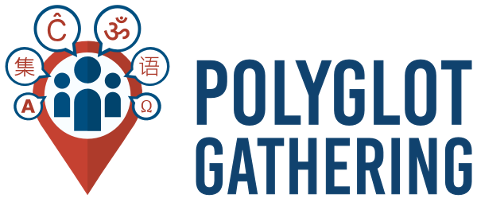Program
Program jest w przygotowaniu. W międzyczasie możesz zapoznać się z zeszłorocznym programem, aby dowiedzieć się, czego możesz się spodziewać.
| Środa, 28 maja | Czwartek, 29 maja | Piątek, 30 maja | Sobota, 31 maja | Niedziela, 1 czerwca |
|---|---|---|---|---|
| Wystąpienia i warsztaty | Wystąpienia i warsztaty | Wystąpienia i warsztaty | Wystąpienia i warsztaty | |
| Obiad | Obiad | Obiad | Obiad | |
| Rejestracja, gry | Wystąpienia i warsztaty | Wystąpienia i warsztaty | Wystąpienia i warsztaty | Wystąpienia i warsztaty |
| Kolacja | Kolacja | Kolacja | Kolacja | Kolacja |
| Program wieczorny | Program wieczorny | Program wieczorny | Program wieczorny | Wieczór pożegnalny |
Jeśli chcesz wziąć udział w Polyglot Gathering jako prelegent, wypełnij ten kwestionariusz, aby poinformować nas, o czym chcesz opowiedzieć.
Prelekcje
Program jest w przygotowaniu, ale oto niektóre wystąpienia i warsztaty, których możesz się spodziewać. Ta lista nie jest kompletna i będzie regularnie aktualizowana.
Zumba Class (for everyone)
Language: Spanish
Relax, have some fun, and dance with us! There’s almost no talking during the class—just music, fun, and me showing you all the steps. You don’t need to be a dancer or know how to dance—it’s all about enjoying the moment, discovering music, and learning steps from around the world. It’s the perfect way to unwind and get energized before the exciting talks and activities for the rest of the day!
Adrian Makoć
Language enthusiast and teacher of Polish as a second language, as well as a dancer and performer. With a deep passion for languages, I’m always exploring new ways to connect through communication and movement. I taught Zumba and other fitness programs in Spain and Poland for around 5 years, blending my love for dance, languages with my cultural experiences. Currently, I work as a language teacher, but the spark for dancing has never left me.
Mentes jóvenes, muchos idiomas: aprendizaje multilingüe para niños de 6 a 10 años
Language: Spanish
En esta presentación exploraremos el fascinante mundo del aprendizaje multilingüe en la infancia, centrándonos en niños de entre 6 y 10 años. Esta etapa del desarrollo es especialmente sensible al aprendizaje de lenguas, ya que el cerebro infantil muestra una gran plasticidad y una capacidad natural para adquirir nuevos idiomas de forma intuitiva y lúdica.
Analizaremos los beneficios cognitivos, sociales y emocionales del aprendizaje de múltiples lenguas desde una edad temprana, como la mejora de la memoria, el pensamiento crítico, la empatía y la apertura cultural. También abordaremos los principales desafíos que pueden surgir, tanto en el entorno escolar como familiar, y ofreceremos estrategias prácticas para crear un ambiente multilingüe eficaz y motivador.
La charla se dirige a docentes, padres y profesionales de la educación interesados en fomentar el plurilingüismo en contextos escolares y domésticos. A través de ejemplos concretos, investigaciones actuales y experiencias reales, reflexionaremos sobre cómo apoyar a los niños en su camino hacia el dominio de más de un idioma sin perder de vista su bienestar y su entusiasmo por aprender
Agnieszka Wójcik-Czerniawska
Agnieszka Wójcik-Czerniawska, Ass. Prof. at SGH- Warsaw School of Economics; Department of Management and Finance. The PhD of Economics field- Management based on the thesis” Development strategies of enterprises in the biofuel sector”; MBA in Spanish- ICEX-CECO- Madrid, DBA ( Doctor of Business Administration,), LL.D ( Doctor of Laws), DPH ( Doctor of Public Health). Visiting Professor at many foreign Universities in Europe (Italy, Spain, France) and World ( Peru, Kenya, Turkey, Georgia). The area of research are connected with: modern finance, finance technology, digital currency, financial isolation, silver generation, circular economy, innovative marketing, society in digitalization world. The participant in many international conferences in all around the world. The keynote speak in world conferences in: Milan, Turkey, Republic of South Africa, Ireland, Bahrain, London . The polyglot with more than twelve languages.
Un tesoro aislado: descubriendo el euskera (An isolated treasure: discovering the Basque language)
El euskera es una de las pocas lenguas no indoeuropeas que se hablan en Europa, y es bien conocido por no compartir raíces ni similitudes claras con ningún otro idioma del mundo. Pero, ¿te has preguntado alguna vez qué significa esto realmente? ¿Y hasta qué punto es cierta esta afirmación? ¿El euskera siempre «sobrevivió» al impacto del asentamiento de las lenguas romances en el sur de Europa o también ha sido influenciado por el latín en cierta medida? Y, en cuanto a la gramática, ¿la forma de expresar ideas y emociones en euskera es completamente diferente en comparación con las lenguas romances?
El objetivo de esta charla es dar a conocer la maravillosa lengua vasca tratando todas estas preguntas, ¡y mucho más! En este curso intensivo introductorio aprenderás sobre el asombroso origen poético detrás de muchas palabras cotidianas en euskera, pero también sobre el contraste en una lengua con un sistema fonético realmente simple y, sin embargo, una gramática compleja y bastante particular. ¡No te lo pierdas!
The Basque language is well-known among the few non-indoeuropean languages spoken in Europe for sharing no clear roots or similarities with any other language on earth. But have you ever wondered what this really means? And to what extent is this statement true? Did Basque always “survive” to the impact of the settlement of Romance languages in southern Europe or has it been influenced by Latin as well to some extent? Regarding the grammar, is the way to express ideas and emotions in Basque completely different compared to Romance languages?
The aim of this talk is to introduce you to the wonderful Basque language by treating all of these questions, and much more! In this introductory crash course you will learn about the stunning poetic origin behind lots of everyday words in Basque, but also about the contrast in a language with a really simple phonetic system and yet a complex and quite particular grammar. Do not miss out!
Ander Chocarro Salaberria
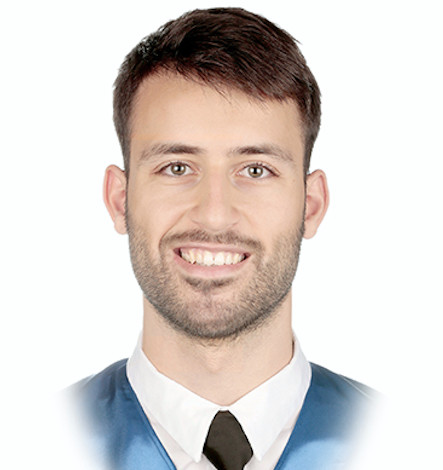
Graduated in Mathematics three years ago and currently pursuing his PhD studies on Architectural Geometry at the Technical University of Denmark (DTU), Ander is a language enthusiast who has learned around 6 new languages during the last seven years. He is originally from the Basque Country and both a native Spanish and Basque speaker. Even though it has always been his mother’s tool for communication with him, Ander is completely aware of the fact that the Basque language is a unique phenomenon in the vast world of languages, and definitely a treasure that deserves to be protected and supported.
Do employers value your language skills?
Language: English
Some airlines pay their staff a little extra for every language they speak, but other employers are entirely uninterested in their staff's language skills. While it has often been argued that these skills offer a competitive advantage and that one can even expect to be paid a premium, this seems to vary a lot from country to country and from industry to industry. In some jobs communication may be less relevant, but more often language skills are beneficial in various ways.
In my own experience speaking Scottish Gaelic, a minority language, gave me the competitive advantage to get a job at the BBC. While my knowledge of several other languages has repeatedly benefited my work, it would seem that they are not interested in the skill.
After reference to some research I want to hear of your experience – good and bad. The more countries and industries we hear from, the better the picture. Depending on the outcome of the workshop a recommendation for employers could be drafted and further research could follow.
I'm happy to take contributions in German, French, Spanish, Italian, Portuguese, Scottish Gaelic and English.
Andreas G. Wolff
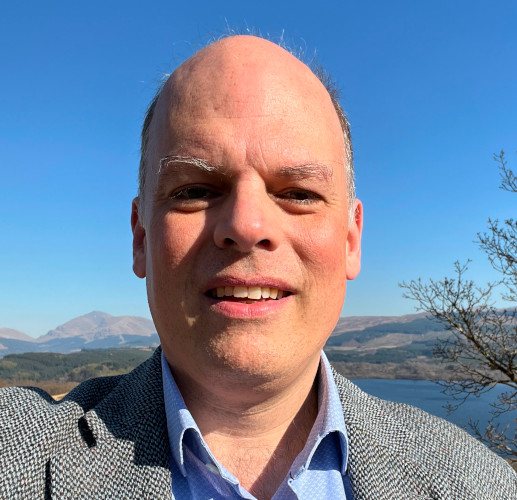
A videojournalist for BBC ALBA, the Scottish Gaelic tv channel, Andreas originally hails from Berlin and has learned Gaelic. He is a regional reporter in the West Highlands, but has also repeatedly reported for a European current affairs programme. Andreas has conducted interviews in English, German, French, Spanish, Italian, Portuguese, Russian, Scottish Gaelic, Irish, Fering (Northern Frisian), Scots and Swedish. He is president and Gaelic tutor of the Taynuilt Gaelic Choir, organises an annual Doric (or North East Scots) Language Bootcamp and is a member of HYPIA.
Jinghpaw, a Tibeto-Burman language between Myanmar and China
Language: English
The north of Myanmar has been shaken both by raging civil war and the recent, devastating earthquake. The multilingual Kachin people inhabit the north of the country and also live across the border in southern Yunnan, China. Their main language is Jinghpaw (aka Jingpo), a Tibeto-Burman language largely unknown among polyglots and most linguists. For my PhD thesis, I explored the topic of language contact in that region and learned to speak the language. In this talk I want to present the orthography, phonology, morphology and syntax of Jinghpaw to give an impression of how the language works. And you will hear how I managed to learn the language without any textbooks, courses or Duolingo.
La klingona lingvo — lingva fulmokurso en facila Esperanto
Language: Easy Esperanto with slides in English
La prezlgo estos en “Facila Esperanto” kun lumbildoj en la angla lingvo. Mi parolos klare kaj malrapide. Certe vi komprenos multe, eĉ se vi (ankoraŭ) ne parolas Esperanton! Provu! penID! Try it!
La lingvisto Marc Okrand inventis la klingonan lingvon en la 1980-aj jaroj por la filmoj kaj serioj de Star Trek. Ŝatantoj kaj lingvemuloj rapide komencis lerni paroli kaj skribi ĝin. La lingvo kreskas ekde tiam kaj nun havas eble 200 aŭ 300 parolantojn. Eble 60 parolas ĝin flue (ankaŭ mi!). La klingona ne havas bazon en naturaj lingvoj. En pasintaj prezentadoj, mi parolis pri la kreado, evoluo kaj la komunumo de parolantoj. Ĉi-foje mi prezentos ĉefe la strukturon: fonologio, morfosintakso, pragmatiko. Aŭskultu lingvistikajn detalojn kaj fascinajn konstrukciojn. Interliniaj glosoj, komparoj kun aliaj lingvoj kaj multe da amuzo helpos kompreni!
Middle Egyptian — An Introduction for polyglots and linguists
Language: English
The classical language of Egypt, spoken around 4000 years ago, was Middle Egyptian. Egyptian (sadly extinct) was a separate branch of the Afroasiatic language family and thus bore resemblance also to Semitic and Berber languages. Not only the hieroglyphic writing system and its decipherment are fascinating, but also the grammatical structure of the language. VSO word order, dual number, a complex system of verbal inflections, many structual and pragmatic particles, etc. It will become evident that the structure of Egyptian is surprisingly simple and surprisingly difficult at the same time. Let's travel back to the year 2025 BC!
André Müller
André Müller holds a PhD in comparative linguistics and has been working with languages from the Caucasus (Tsez, Dargi), Southeast Asia (Jinghpaw, Lhaovo) and North America (Dënë Sųłınë́). At the moment he teaches German as a second language in Leipzig. His interest includes language learning (of course), typology, grammatical structures, phonetics, constructed and extinct languages.
Experience the student perspective: I'll teach you Telugu in 3 different styles
Language: English and Telugu
Telugu, a beautiful Dravidian language from the south of India, ranks as the 17th most spoken language in the world with 96 million L1 + L2 speakers. However, as it is not very well known and not often studied outside of the Indian cultural sphere, you may not have heard of it ever before. If so, worry not: it makes you the perfect fit for this workshop (but also feel welcome if you know some Telugu or have heard of the language of course!). Within these 45 minutes, you will experience Telugu from a super-beginner student’s perspective, engaging with the language using three different learning styles. Which styles are those? Be sure to join and find out! The only giveaway is that this will not be traditional classroom study. Afterwards we will discuss which style you preferred, and I will be happy to hear your thoughts and feedback.
Anika Rettig
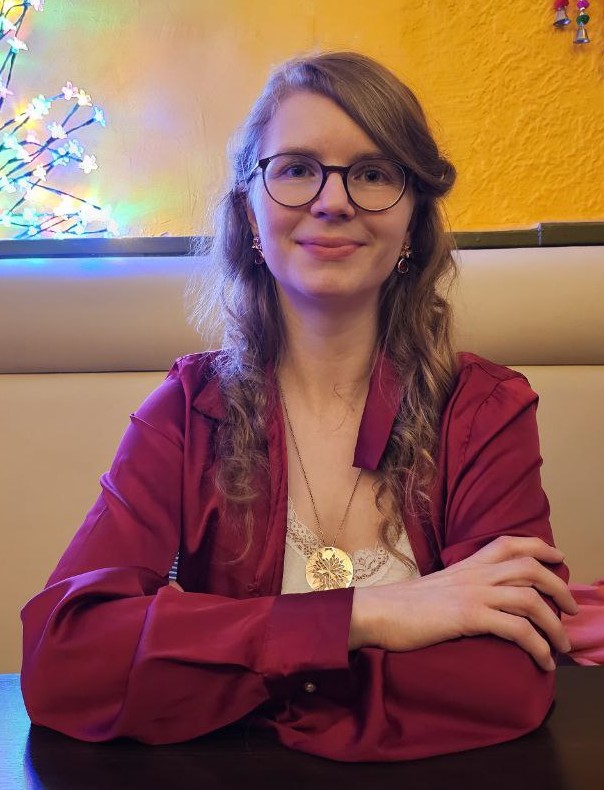
Anika has always been fascinated by the different scripts of languages, but for most of her life, she felt like learning a language was only possible in a traditional classroom setting. Faced with the challenge of learning her partner’s language Telugu, for the first time this approach didn’t work, which led her to research other options, and to eventually discover communication-based approaches like TPRS. She fell in love with this way of learning, leading her to experiment with it in different languages, attend seminars, explore its limits and eventually start teaching in this way to share her experience with others.
Quechua: Aprendemos el idioma de los Andes
Language: Spanish
Antes aprendieron un idioma indígena? El Quechua es el más grande del continente Americano. Sus hablantes se conectan en el pasado con el gran imperio Inca. En este Workshop no solo aprenden los bases del idioma sino también sobre el contexto de su uso y porque es algo muy especial aprender el misk’i runasimi de los Andes.
Anna Reyeros Petsch
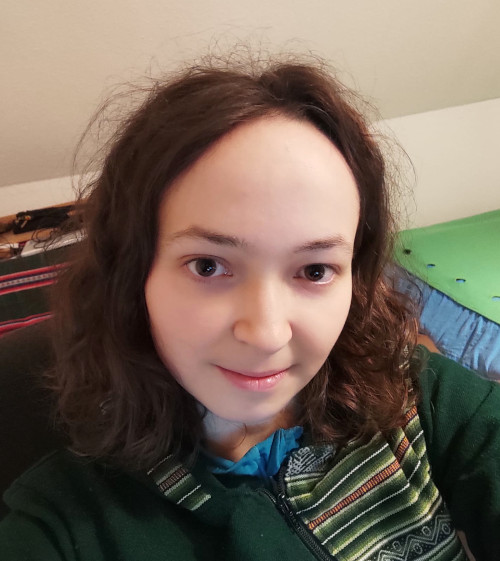
Anna Reyeros Petsch has first discovered her interest in language learning during an exchange year in Ireland. After French she started to learn Quechua at university and can now look back on over four years learning the language. During that time she has spent a year in Cusco, Peru, working with Quechua communities and completing in August 2024 her Quechua diploma at the Academia Mayor de la Lengua Quechua.
Roleplaying with Chat-GPT – A fun way to practice writing in your foreign languages
Language: English
You want to practice writing in your languages, but you don’t like writing a diary or find it hard to come up with exciting topics to write about? You really want to talk to your imaginary friends, travel to the past or the future or maybe just to the place where your language is spoken?
Recently I discovered how to do all of this using an AI-Chatbot as a Role Playing buddy. The AI won’t judge you, speaks lots of different languages and will support your wildest creative ideas. I want to share some thoughts with you, on how you can use this to practice your writing in different languages, let your imagination go crazy and have lots of fun at the same time.
Astrid Stangl
Astrid lives in Vienna (Austria) and works as a tourist guide, a job that allows her to practice speaking in different languages almost every day. It also involves telling stories about people who lived in the past, and Astrid thinks that storytelling can also help us and motivate us in our language learning. Because stories are something everybody needs and they make us happy.
How to feel like local in Istanbul: useful phrases and gestures in Turkish
Language: English, Turkish
After last year's interest, I am back with making sure you practise some necessary body language to get by while visiting Turkiye. My session will help you navigate the Grand Bazaar, order food at "lokantas", strike up conversations with local business owners, commonly known as the “esnaf”, ask for directions, and avoid scammers targeting tourists. This session will help interpret non-verbal cues, respond to basic questions like a Turk, and think like an “Istanbulite” through role-playing games that simulate everyday scenarios. Prepare yourself for a few memorable phrases that will help you blend in to the bustling streets of a Turkish megacity.
Asya Cariuk
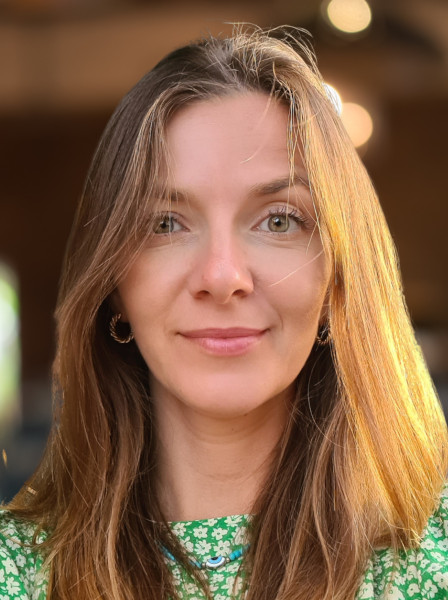
Born in a small Belarusian town, Anastazja speaks multiple languages. She moved to Poland, the home of her grandparents, when she was 16, and after finishing her education, she set out on a lifetime travel journey. She was able to live and learn languages through immersion as she lived in eight different countries, ranging from China to the Middle East and Ireland. Turkiye is one of her favourite destinations, as it is where she has developed her ability to fit in with the locals. She enjoys showing people Istanbul, which she believes is the greatest city on Earth.
呀! aa3! Cantonese Sentence-Final Particles: The Secret Sauce of Expression
Language: English and Cantonese
We Cantonese users would like to let you in on the real secret behind why Cantonese sounds so uniquely expressive. It’s the reason you can almost hear the exact emotions through a mere text message written in the language, and the reason why translating Cantonese sentences accurately is a task for the bravest among us. You think Cantonese tones are tough? Wait until you meet the final boss. Sentence-final particles (SFPs) – the cheeky little buggers that’ll make or break your day.
These particles – surprise surprise – hang out at the end of sentences or clauses. Depending on how you use them, they either perfect or ruin your speech, or aid or destroy your job interview. Get them right, and they’ll cement your relationship with your in-laws; get them wrong… good luck at the family dinner.
Even if you’ve memorised the entire Cantonese dictionary, sentence-final particles will remain the difference between sounding like you’re quite good at Cantonese and being a pro. The stakes are pretty high.
Welcome to the power of 呀 (aa3), 喇 (laa3), 嘅 (ge3 / ge2). Welcome to the magical world of delightful semantic chaos. Welcome to SFPs. T&Cs apply.
Aurum Lai
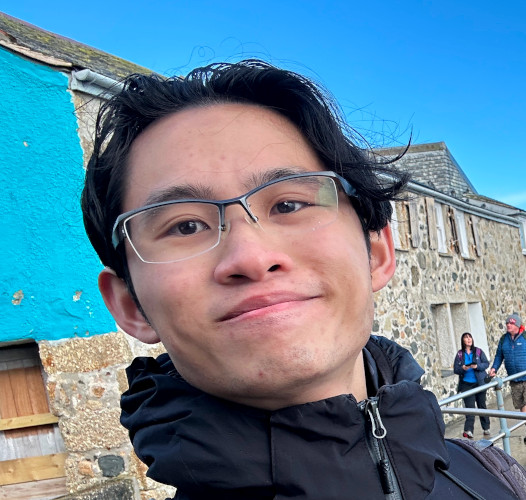
Aurum was born in Hong Kong and is currently based in the UK. He’s loved languages ever since he failed his first French exam at school, after which he made it his goal to get top grades in French. He worked so hard on his grammar and vocabulary that he fell hard down the rabbit hole of languages and linguistics. A native speaker of Cantonese and English, he also learned Mandarin in primary school. During university, he worked as a part-time Cantonese/Mandarin-English interpreter.
Curro corre tras el carro y otras trabalenguas españolas
Language: Spanish, English
We are going to have fun with Spanish tongue twisters. Although Spanish is not the hardest language to pronounce, there are quite numerous tongue twisters we can use to train our brains. Let's learn them together!
Vamos a divertirnos con trabalenguas españolas. Aunque el castellano no parece el idioma más difícil, hay bastante numerosas trabalenguas que se puede usar para entrenar nuestros cerebros. ¡Aprendámoslos juntos!
Blanka Rzewuska
Blanka is quite active polyglot trying to make the best of her life. She has finished two faculties at the Warsaw University, she hasn't finished learning languages and not only languages.
Teaching (and learning) smart
Language: English
Teaching online is the smartest way?
A few years ago, teaching online seemed to be the Holy Grail. Teachers were now free, more independent, able to work from anywhere, and found students more easily. All our dreams came true. Or did they? Teaching online is still about selling our time. After a certain point, it is not scalable any more.
How can we scale our teaching business? Instead of selling our time, let’s start selling our expertise! Should everyone make online courses then? Only if you want to. There are plenty of ways we can work with students without having private or group lessons with them.
In my talk, I will tell you about my past four years when I quit giving lessons and started working in asynchronous and hybrid formats with people. I will share how I found my niche, what work formats worked for me and for my students, and what challenges I have faced.
Teachers and students are all welcome.
Bozorádi Petra

Petra is linguist and a Hungarian tutor. She has been working as a teacher for 20 years. She has come a long way to finally doing what she truly loves. Instead of merely ‘teaching’ people, she helps them find their way to the language and become successful language learners.
Poliglotti in Movimento: La Kinesiologia a beneficio dell'apprendimento delle lingue
Language: Italian and Mexican Sign Language / Lingua Italiana y Lengua de Señas Mexicana
Collegare il nostro cervello al nostro corpo e farli lavorare insieme sembra facile, ma: Stiamo davvero sfruttando tutto il nostro potenziale? Dalla mia esperienza come Ballerina professionista, metto tutto in relazione al movimento; pertanto, desidero presentare agli amanti delle lingue, opportunità e possibilità di tecniche e metodologie che possono svolgere per ottenere il migliore utilizzo nell'apprendimento delle lingue attraverso la kinesiologia, visto da diverse sfaccettature del movimento: artistico, sportivo, del benessere e della salute fisica, mentale ed emotiva, per sviluppare con gentilezza i nostri obiettivi e raggiungere i nostri traguardi nell’acquisizione di nuovi linguaggi partendo da un approccio olistico.
Brenda Liliana Ruvalcaba Montoya
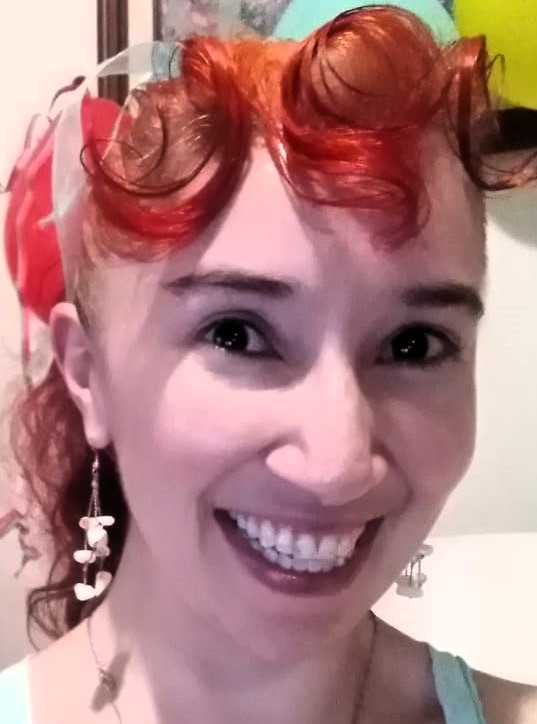
Brenda Liliana Ruvalcaba Montoya. Artistic name: Brandy Ruvalcaba. Mexican. Professional Dancer. Magician-Illusionist. Juggler. Dog Trainer. Polyglot in Spoken and Sign Languages. Creator of “Special Tangotherapy for Patients with Parkinson’s”. Speaker at TEDx: “Tangoterapia, un abrazo de vida.” Choreographer. Gymnast. Nutritionist. Evangelist of Korean Culture in Mexico. International Relations. Member of the Technical Committee of the Mexican Gymnastics Federation.
Mastering Languages, Missing the Point? A Critical View of Polyglossia
Language: English
This talk takes a hard look at what people call polyglossia—the practice of learning and using multiple languages. Over the past 20 years, language learning has become more than just a skill; it has been turned into a marketable product, fueling what I call the Polyglot Industry. This industry promotes a polished, commercialized image of multilingualism—one that often prioritizes visibility and profit over real, lived language experiences.
First, I’ll examine how the Polyglot Community has partially (d)evolved into an industry shaped by economic and social forces. This shift has created a Polyglot Matrix—a set of beliefs about who counts as a successful polyglot and how languages should be learned. But is this vision inclusive, or does it exclude certain voices?
Second, I’ll introduce Critical Polyglot Studies (CPS), a new approach that pushes back against these limitations. CPS is not just a theory; it’s a movement that challenges mainstream narratives and offers real-world alternatives.
This talk isn’t just for scholars—it’s for anyone who cares about multilingualism beyond the hype. Let’s rethink what it truly means to be a polyglot in today’s world.
Carlos Yebra Lopez
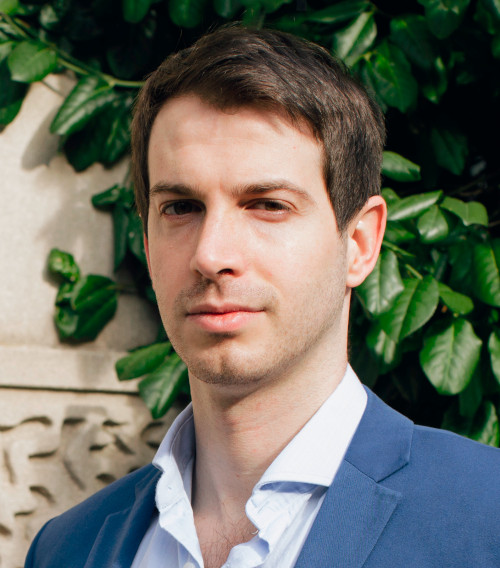
Carlos Yebra López is Assistant Professor of Spanish Linguistics at California State University, Fullerton. He is also founder of The Hyperpolyglot Activist and Ladino 21 Community Interest Company, and the Director of Research at The International Association of Hyperpolyglots (HYPIA). Together with HYPIA’s director, Dr. Usman Chohan, he has recently published the book Critical Polyglot Studies (Routledge, 2025)
Overcoming mental roadblocks in language learning
Have you ever wondered what is holding you back? Why on earth is your progress stalled, even though you just found a new language, revived an older one, met new friends, discovered literature… You learn a day, two, then take a break. At day 133 of your “pause” you wonder if you will ever achieve anything meaningful with your studies. Every restart feels harder. Eventually, you start dreading all this. You avoid conversations about your goals as they make you feel ashame.
In worst case, you may consider not visiting language events anymore. The ’backlog’ of language learning you feel piling up on your shoulders seems just too embarrassing. It is a spiral which is easy to enter, as life happens, and sometimes throws curveballs at us.
This is, however, not a prophecy, and you can change it anytime. No matter how long you have been riding this road, you can leave it anytime. I know. I have been there, for around 20 years, and I have never felt better about language learning than today, and it is just the start.
Allow me to give some inspirations from my personal life and building up on advice of experts in psychology.
Christian Vetter
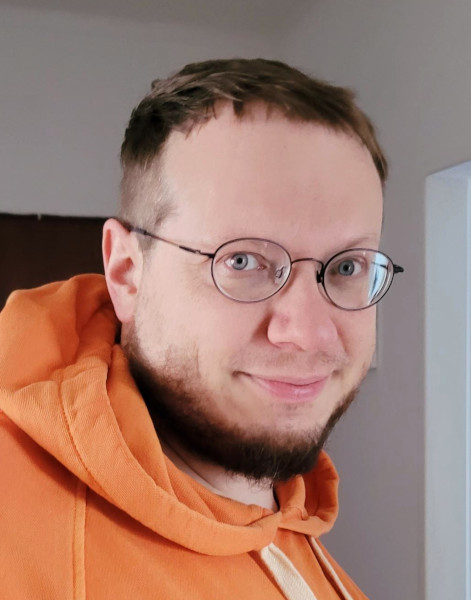
Born and raised in Germany, Christian was always intrigued by other languages in cultures. Being tired of the discouragment in his social circle, he left eventually for a bigger city.
He loved the next language, the grass on the other side, always a bit too much. ;-)
In 2018 though, he entered a job in Customer Support, which facilitated organized learning as clients are eager (and sometimes expecting) written and spoken replies in their languages.
As of today, he speaks German (native), English, Dutch, Spanish, can converse in some Italian and French, and is learning the languages of his best friends (Finnish, Lebanese Arabic, and at the time of the conference, Czech).
Polyglot Gathering's Inspiration from Esperanto Culture: More Than Just Words
Language: English
The Polyglot Gathering was born from a desire for deeper linguistic immersion, inspired by Esperanto youth events that foster connection beyond formal talks. In 2013, Judith Meyer and Chuck Smith attended the 2-day Polyglot Conference in Budapest, but while they greatly enjoyed it, they felt something was missing—a more casual, engaging space for attendees to interact beyond lectures.
They envisioned a dynamic environment where participants could sleep, eat, and engage in language programs all in the same space, much like Esperanto events. This led to the creation of the Polyglot Gathering, incorporating features like the Tea Lounge [Gufujo], Talent Show [Interkultura Vespero], and No English Zone [Aligatorejo].
Evening programs bring language immersion to life, with events like the International Culinary Festival, concerts (including record-breaking jOmO), and quiz shows. Uniquely, the Gathering is not top-down—anyone can apply to speak, promoting a truly collaborative atmosphere.
Now organized by an Esperanto non-profit, the Gathering embodies the spirit of linguistic unity, with most of its team communicating internally in Esperanto. The Gathering continues to shape the global polyglot community, making it more than just a meeting—it’s an experience.
Chuck Smith
Chuck Smith is a pioneering figure in the polyglot and Esperanto communities, co-founding the Polyglot Gathering and Esperanto Wikipedia. His influence extends to language learning platforms, having contributed to Duolingo’s Esperanto course and co-founding Amikumu, an app connecting language learners worldwide. Beyond his linguistic work, he develops iOS apps and games and works in social media video post-production. Honored as Esperantisto de la Jaro in 2015, Chuck continues fostering multilingual connections—most recently as co-host of Ludo, an intimate bilingual gaming event at the Esperanto-Stacio near Berlin.
ale li pona: what do you know about the language of good?
Language: English
Toki Pona, literally the ’language of good’, is a constructed language that allows people to communicate clearly using 120 words in total! It makes extensive use of imagination and empathy, while aiming at the very ’heart’ of things. Would you like to learn some?
Claudio Cantale
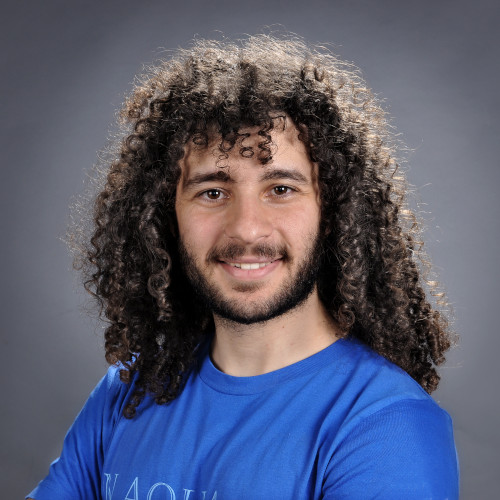
Passionate teacher and storyteller. Everything’s a story: you’ve been making one since the moment you woke up today. How’d you like to end it? Please, tell people about it. Make it happen.
Speed Connecting: The Icebreaker Game for Language Lovers
Language: Multilingual
Come and meet new People, one Conversation at a time!
Want to make instant connections with fellow language lovers? Join Speed Connecting, a dynamic and fun networking game that ensures you properly meet a handful of new people in just one session! You’ll be randomly paired with another participant for a 5-minute conversation, then switch to a new partner in the next round. And so on... Speak any language you like — the only rule is to engage and enjoy!
This is the perfect icebreaker at the start of the conference, helping you turn strangers into friends in a relaxed, low-pressure setting. Whether you’re here for the first time or a returning attendee, Speed Connecting will spark great conversations and expand your global network.
Optional Icebreaker questions will be provided as inspiration. I will guide you through the game and keep the energy high — just come as you are!
Are you ready to make meaningful connections in just minutes? Join us and let the conversations begin!
Daniele Bozzi
Daniele Bozzi is a polyglot at heart, his passion for language learning started at a young age. Known for his open and entertaining personality, he loves bringing people together and turning gatherings into truly meaningful experiences.
As a Community Manager at various software companies, his current job is to spark meaningful connections online and in person. His “Speed Connecting” game is a favorite at conferences, weddings, and festivals. (This year will be his first time attending Polyglot Gathering and he cannot wait to run this game for his own community!)
Introduzione al ligure: storia, diffusione, caratteristiche, letteratura
Language: Italian
Nel senso comune il ligure viene spesso considerato un dialetto dell’italiano, ma in realtà, dal punto di vista scientifico, rappresenta una lingua a tutti gli effetti. Esso, infatti, non deriva dall’italiano, ma, come il francese, il portoghese o l’italiano stesso, deriva direttamente dal latino, ossia è una vera e propria lingua romanza ed è classificato, in particolare, tra le lingue galloromanze, le lingue neolatine a sostrato celtico. In questa presentazione, faremo un affascinante viaggio attraverso il tempo e lo spazio, un viaggio che dal misterioso popolo dei Liguri antichi, forse addirittura di origine preindoeuropea, ci porterà in ogni angolo del Mediterraneo lungo le rotte secolari della Repubblica di Genova, dalla Corsica alla Crimea, dalla Sardegna al Principato di Monaco, dalle coste tunisine alle isole greche, da Costantinopoli al Caucaso, e poi, seguendo le direttrici dell’emigrazione italiana, fino all’Atlantico e al Pacifico. Nel corso di questo itinerario, avremo modo di conoscere non solo la storia e la geografia del ligure, ma anche le sue principali caratteristiche fonetiche e sintattiche, nonché di scoprire qualcosa della sua interessante tradizione letteraria, che dal poeta medievale conosciuto come Anonimo Genovese giunge fino al celebre cantautore contemporaneo Fabrizio De André.
Davide Bozzo
Davide Bozzo is linguistic specialist at the Center for Language Evaluation and Certification of the University for Foreigners of Perugia. He taught Italian language and culture in the same university as well as at the University of Florence and McGill University and he was director of the Cinque Terre Summer School. He received a PhD in Philosophy (University of Pisa) and a Master’s Degree in Teaching Italian as L2 (University of Padua). He is president of a Ligurian dialectology society and artistic director of a Ligurian language music festival. He writes lyrics for his band, fifth times winner of the Ligurian language song contest.
Italiano vs español: similar but different
If you already know Italian or Spanish, you have a head start in learning the other. But be careful: similarities and false friends can be tricky! This bilingual presentation is designed for those who want to fully leverage the connections between Italian and Spanish while avoiding common pitfalls of linguistic overlap.
Through practical and engaging examples, we’ll explore shared grammatical structures, pronunciation differences, and deceptive vocabulary. You’ll gain useful tools to confidently navigate your first conversations, with strategies to turn your existing knowledge into a strong foundation for learning the other language.
Ready to discover how easy (and fun) it can be to build a bridge between these two sister languages?
Davide Gemello, Pedro Rodriguez Trigo
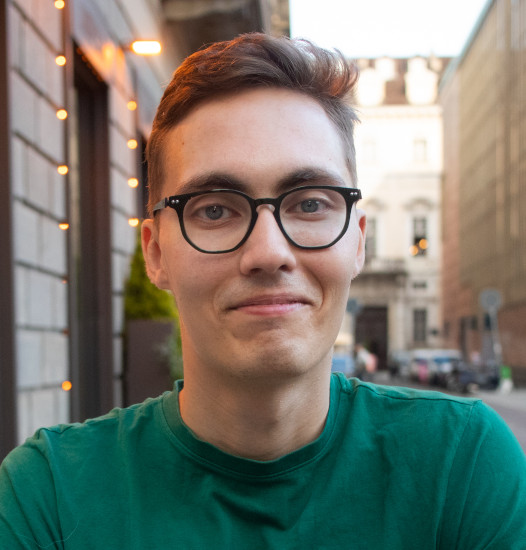
Davide Gemello is a content creator, language lover and founder of Podcast Italiano, a project for people learning Italian.
Pedro Rodriguez Trigo is a polyglot, language teacher and content creator from Spain.
自分を克服する。私の言語は私について何を教えてくれたか。Overcoming myself in the process – What have my languages taught about me
Language: Japanese (slides in Japanese and English)
複数の言語をマスターすることは数年間、数十年間かかります。このプロセスに習得者はどうしてもついに「自分」と立ち向かわなければなりません。複数の言語にペラペラになりたいですか?もしそうなりたいのであれば、自分自身を習得者として見てみましょう:好きな習得する方法、強み、避けることや引っ掛かるところなど。私(えーろ)は習得者として自分の言語との歩みをここで話し、私が学んだ各言語は私自身について何を教えたかをシェアしたいと思っています。あなたの言語はあなたについて何を教えましたか?
Eero Huhtanen
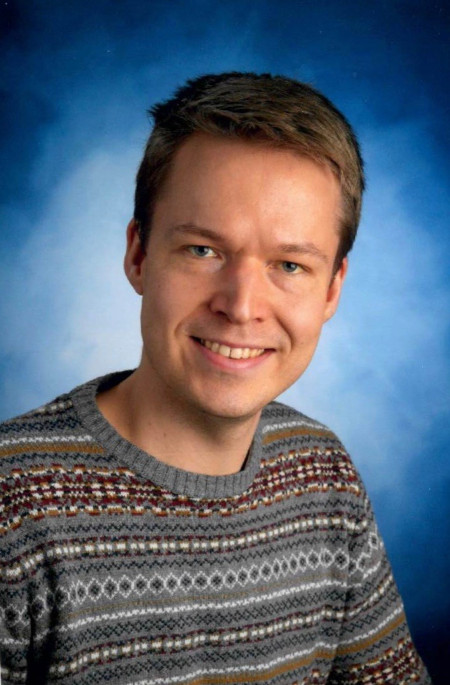
Eero is a language enthusiast with a background and university degree in psychology. He’s currently living in Japan as a coordinator for international relations for Finland and a Japanese small countryside town. In his spare time he hopes to encourage people around him to learn languages that are meaningful to them and use their limited time resource productively. His main languages are Japanese, Spanish, English, French, Swedish, Danish and Korean.
Building Your Personal Language Learning Strategy: A Step-by-Step Approach
In this workshop, whether you are a language learner or a language coach, you will learn how to build a personalized language learning strategy using a clear, step-by-step approach. This method will help you focus on what matters most, optimize your learning, and achieve results faster.
Using your own language as an example, you will define your goals, create a structured plan, and break the learning process into manageable steps. You’ll also learn how to apply this strategy to help others effectively.
By the end, you’ll have a concrete, personalized plan for your language journey and tools to help others. If you want more structure and clarity in your learning or consulting, this workshop is for you!
Elena Kocheva
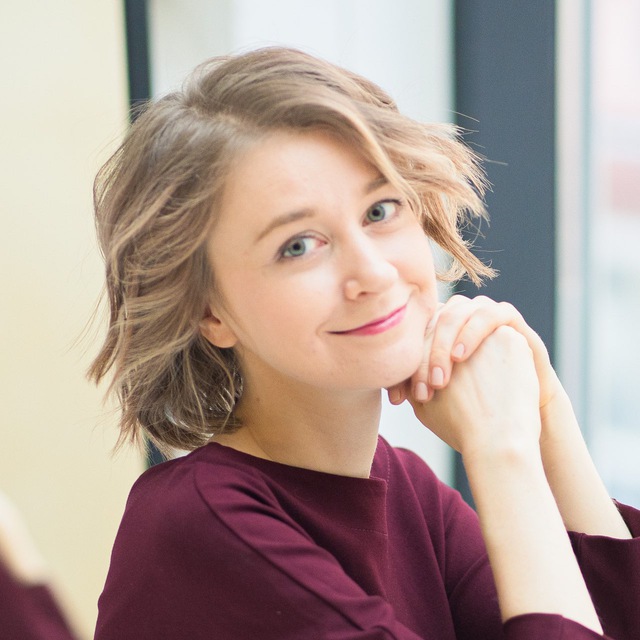
Elena Kocheva is a language coach, polyglot, and former IT analyst. She helps people learn foreign languages by combining innovative methods with a project-based, systematic approach, crafting personalized strategies that deliver maximum efficiency. She has helped over 250 clients, including C-level executives of major tech companies, learn languages as a coach.
Combining her own experience in language learning out of passion and necessity with the experiences of her clients in various life situations, she shares her product-oriented methodology to help achieve results efficiently.
Elena is also the author of the book Lingua Hacking: How to Learn a Foreign Language Effectively and Without Burnout (published in Russian) and runs the blog Изучение языка как стратегия on Telegram.
What is "progress" in language learning?
Language: English
Progress is a major focus in language learning – but what does it actually mean to make progress? Many learners look to formal markers like CEFR exams to measure their growth and while that can be a useful indicator, they only capture part of the picture. In the first part of this talk I want to address the many other milestones – like reading your first book or being able to pronounce a difficult word – that are often overlooked.
In the second part, I want to address that every metric we use, whether test scores, word counts, time spent learning, is just a proxy for the underlying “language knowledge”. And while useful, these proxies can be misleading – just because you sit down to study for an hour doesn’t mean you learned one hour worth of information (whatever that would be anyways).
Language knowledge is an incredibly complex topic, with many factors (often outside of our control) influencing how well we are able to learn a language.
Emine Tedman
Emi is an aspiring polyglot with a Bachelor’s degree in English and Japanese and an (almost) Master’s degree in Linguistic Data Science. She loves learning about general linguistic theories and connecting them to language learning and teaching people how linguistic principles can make language learning easier.
The Linguistic Landscape of North America
Speak English, you're in America – no, not at all! Before some English people (and other Europeans) thought they had to impose their language and culture on everyone, there were hundreds of indigenous language communities from many different language families in North America. The most important language families include Algonquian languages (including Ojibwe and Potawatomi), Iroquoian languages (including Cherokee and Mohawk), Siouan languages (including Lakota), and Athabaskan languages (including Navajo).
But what makes these languages fascinating? Is it their long one-word sentences, or is it because they impose a challenge for traditional, eurocentric linguistic categories? In some Iroquoian languages, the words for father, horse and restaurant may actually be verbs. How that is possible, you ask? Valid question, which we hope to give answers to in this workshop.
čecholalie – neurodiverzita a učení jazyků
Language: Czech
Jste někde na autistickém spektru nebo máte ADHD? Nebo znáte lidi, kteří jsou neurodivergentní? Pak je tento workshop právě pro vás! Možná je pro vás učení jazyků někdy složité, nebo jednodušší než pro ostatní. Nebo obojí – jako u nás. Máte někdy problémy v sociální interakci a strach z odmítnutí, jako my? Promluvme si o tom, jak si přesto můžeme procvičovat své jazyky. Máte echolalii? Podívejme se, jak může echolálie a autostimulace pomáhat při učení jazyků, a jak se samo učení jazyků může stát autostimulací. Chcete se podělit o své individuální zkušenosti? Tento workshop je ta správná platforma! Rády bychom slyšely, jaké jsou vaše problémy a strategie. Koneckonců, každý/každá z nás je jiný/jiná – ve slově neurodiverzita je i slovo diverzita, a diverzita je důležitá!
Felicitas Andermann & Ronja Sturm
Felicitas Andermann is a PhD student in theoretical linguistics at Leipzig University. Her research interests lie in morphological theories and their predictions and verbal inflection. She has been working mainly on Potawatomi (Algonquian, North America) lately.
Ronja Sturm is a BA student in linguistics at Leipzig University. She is interested in linguistic typology as well as syntactic and morphological theory. She is currently working on converbs and likes languages with a lot of affixes.
Latin and Greek: The forgotten key to multilinguism
Language: Italian
Unlock the secrets of the European intellectual lexicon and discover how Latin and Ancient Greek shape modern languages! In this engaging talk, you’ll explore how these ancient languages have influenced vocabulary across many European languages. Words like philosophy and democracy are shared across languages such as English, French, German, and Russian—discover how these roots connect cultures.
Surprising words with classical roots will also be revealed. For example, “biscuit” comes from Latin bis (twice) and coquere (to cook), while “salary” stems from salarium, meaning “payment for salt.” These unexpected examples show how Latin and Greek permeate everyday language.
The talk also highlights how Latin and Greek case systems influence the grammar of modern languages like German and Russian. Understanding these systems gives you a head start in mastering complex syntax.
Finally, we’ll emphasize the importance of engaging actively with Latin and Greek—not just reading or translating. Speaking, writing, and discussing these languages helps internalize vocabulary and grammar, accelerating your progress in any modern European language.
This talk will give you the tools to enhance your language learning and unlock new dimensions of understanding European languages!
Francesco Morganti
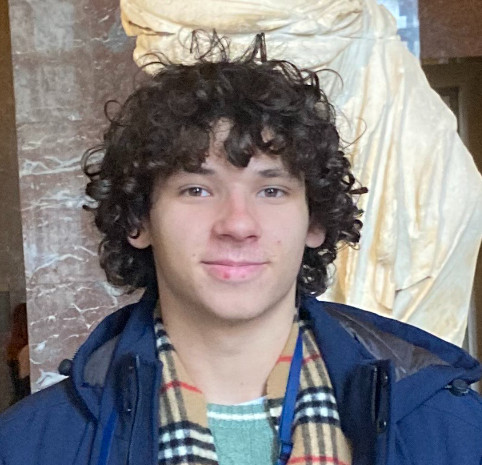
Francesco is a 16-year-old classicist and language enthusiast from Italy, attending a school near Rome. He developed a passion for Russian language and literature at age 13 and has since expanded to six other languages. For Francesco, learning a language is accessing the culture it represents, with a focus on reading classical works in their original languages. As a student at Accademia Vivarium Novum, he has developed fluency in Latin and Ancient Greek, exploring how they enhance language learning. Francesco is involved in multilingual local projects aimed at fostering inclusion. He is also passionate about philosophy, literature, and the arts.
Greek Temporal Oddities
Language: English & Greek
This workshop explores time as it runs across Greek tautological syntax patterns. We will see how the semantics of “time” and “addition” overlap in different languages, and how Greek brings both together through the concept of “otherness”. You need to be at least half-A1 to be able to follow this presentation… or just extremely confident.
George Karampalis
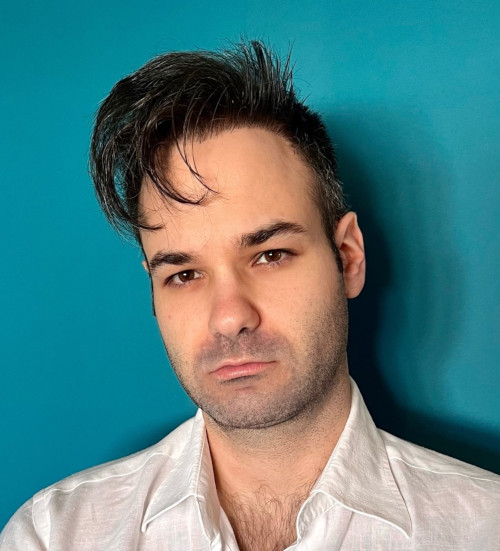
George (or Yorgos) is an educational-content creator, Greek tutor, and adept procrastinator. He enjoys breaking down language structures through context, etymology and comprehensible input. He has co-founded Difficult Greek, a project consisting of a website and a YouTube channel, on which he should post more often.
¡Asere, qué bolá! Descubre el español cubano con sabor y ritmo
Language: Spanish
Cuban Spanish isn’t just a way of speaking—it’s the rhythm, history, and soul of Cuba wrapped up in every word! In this lively, hands-on session, we’ll jump right into the sounds, slang, and expressions that make Cuban Spanish one of the most colorful and energetic dialects out there.
With plenty of laughs, stories, and fun role-playing, we’ll explore how the language captures the spirit of Cuba—from the buzzing streets of Havana to the infectious beats of son, salsa, and reggaetón. You’ll pick up real Cuban slang, learn how to sound like a local, and uncover the rich culture and history woven into everyday conversations.
Get ready to laugh, move, and maybe even dance a little! We’ll dive into daily expressions, tasty Cuban food, and the music that keeps the island alive. Along the way, we’ll touch on Cuba’s Afro-Cuban roots, its fascinating history, and the creative ways its people bring language to life.
Guillermo Manzano Fabré
G is a Cuban polyglot and intercultural expert based in Cologne, Germany. As a systemic coach and facilitator, he helps people navigate cultural differences. He is currently completing his Masters in Business Psychology with a focus on organizational development and AI. Passionate about Asian and Bantu languages, G explores linguistic and cultural connections across regions. When not studying or coaching, he trains for triathlons, does circuit training, and practices cryotherapy - always pushing himself mentally and physically
The Importance of Lusophony in the Iberian Peninsula: A Vehicle for Development and Cultural Exchange
This talk explores the cultural, historical, and economic significance of Lusophony in the Iberian Peninsula. From its role as a bridge between Europe, Latin America, Africa, and Asia to its contribution to regional development, Lusophony serves as a powerful vehicle for communication, exchange, and growth. We will also examine how learning Portuguese opens doors in both personal and professional contexts, fostering international connections and a deeper understanding of linguistic diversity.
Guillermo Renda
Guillermo is a Galician with deep Lusophone roots, as both sets of grandparents are Portuguese. Although their professional background lies in a technical field, they are making an exception to share their passion for languages and their heritage. Fluent in Spanish, Galician, a language closely connected to Portuguese, and Portuguese itself, they bring a unique perspective shaped by their upbringing and family ties. Their talk aims to highlight the role of Lusophony as a bridge for development and cultural understanding in the Iberian Peninsula and beyond
Don't Fall for These! The Sneaky World of False Friends
Language: English
Learning a new language can be an exciting endeavor, but it also comes with its share of surprises—especially when it comes to false friends. These are words that look or sound similar across languages but have very different meanings, often leading to mix-ups and mistakes by learners.
In my talk, I’ll dive into the world of false friends in language learning, focusing on Finnic, Baltic, and Slavic languages. I’ll explore how these linguistic tricksters can give learners a false sense of mastery, making them think they’ve nailed a word or phrase when they actually haven’t. Through real-life examples, we’ll see how even the most enthusiastic language learners can be caught off guard by these sneaky words.
Join me as we explore how false friends slip into everyday conversations and learn to spot them before they lead to any misunderstandings.
Introduction to the Latgalian Language
Language: English
Latvian and Lithuanian are often considered the most archaic living Indo-European languages. But what about Latgalian? Could it be a language in its own right, and not just a dialect of Latvian? And could it be even more archaic than Lithuanian?
Spoken by about 165,000 people, mostly in Latgale, eastern Latvia, Latgalian is unique—but hardly understood by other Latvians. The Latvian nation and the country of Latvia are likely to have derived their name from the Latgalians. While written historical sources mention Latgalians as early as the 11th century, archaeological evidence from burial traditions suggests that their presence can be reliably traced back to the 6th-7th centuries.
In this language crash course, I will briefly examine Latgalian from a historical and linguistic perspective, comparing it to Latvian and Lithuanian and assessing the influence of Slavic languages on it. We will also learn some basic phrases in Latgalian to bring this fascinating language to life.
Join me in uncovering the story of Latgalian—an overlooked gem of the Baltic linguistic heritage!
Inese Pintāne
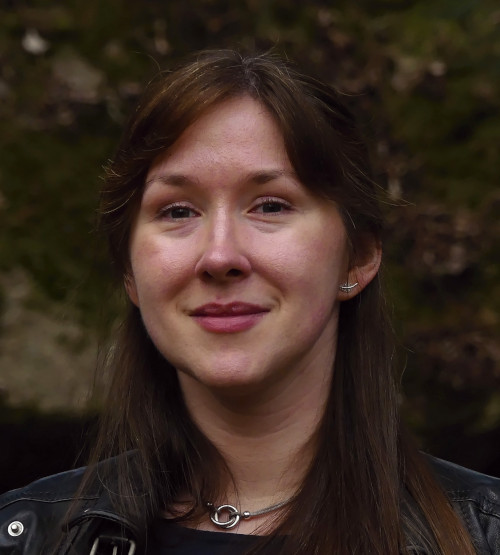
Inese Pintāne is a folklore researcher, linguist, and translator. Her academic path commenced with a Bachelor’s in Finno-Ugric Studies, followed by two Master’s degrees—one in Semiotics and Electronic Culture, and the other in Modern Linguistics. Currently, she is working towards a PhD in Slavic Philology. Her research focuses on how language shapes our cultures and the important role storytelling plays in preserving traditions.
Српскохрватски, Хрватскосрпски, БХМС, Нашки: један језик или четири?
Language: Serbian
Српски, хрватски, босански и црногорски – да ли су то четири засебна језика или варијанте једног језика? Ова тема изазива дискусије међу лингвистима и говорницима ових језика.
У овом предавању ћемо истражити историјски развој српскохрватског језика, разлоге за његову поделу и степен узајамне разумљивости између његових савремених варијанти. Да ли су разлике веће од оних између британског и америчког енглеског или између европског и бразилског португалског? Ко одлучује шта је језик, а шта дијалекат?
Осим тога, причаћемо о томе шта ова подела значи за полиглоте који желе да науче један или више ових језика. Да ли треба да учите „четири“ језика или је довољно научити један? Ако вас занимају словенски језици, овај разговор ће вам помоћи да разумете њихову динамику и лакше одаберете стратегију учења.
Дођите и откријте како историја и лингвистика обликују оно што зовемо језиком!
Isailo Dondic
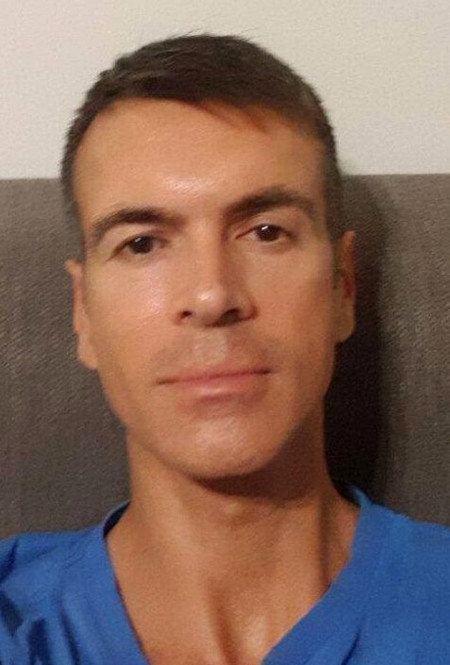
Isailo Dondic has been a mathematics professor for many years, but he has also had a long-standing passion for languages. In addition to his native Serbian, he speaks German, English, Russian, Spanish, Portuguese, Esperanto, Italian, and Romanian. His interest in languages led him to start a YouTube channel in 2024, dedicated to the Serbian language. Through his work, he enjoys exploring linguistic connections, teaching, and helping others understand the beauty of Serbian and other languages.
More than perfect! Verb aspects across languages
Language: English
Many language enthusiasts will be familiar with the concept of grammatical aspects: the different ways that an action relates to time, as opposed to tense, which expresses when an action happens. However, a lot of us limit our understanding to perfective and imperfective aspects, denoting complete and incomplete actions respectively. Having previously written a popular article explaining these two aspects in Slavic languages, in this talk, I would like to dig deeper into the riveting world of aspects, and explore how different languages treat aspect drastically differently, how detailed you can express an aspect, and how aspects can be combined with each other or with different sentence structures.
The complexities of translating time from one language to another have always fascinated me. I hope that you will have opened your mind (see what I did there?) to the endless possibilities that time can be moulded and communicated in language.
Israel Lai
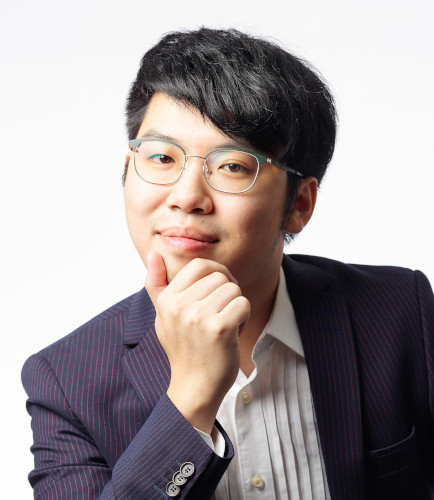
Israel Lai is a composer by day and a language learner by night. He discovered his passion for languages when he first taught himself German on his own, over ten years ago. Amid lockdown, he created the language-linguistics podcast 絮言.狂想, discussing language topics closer to Cantonese listeners and creating listening materials for Cantonese learners. He also runs the YouTube channel Rhapsody in Lingo, creating multilingual videos about his language learning and life abroad. Israel is currently pursuing a PhD in Composition at the University of Manchester. He is also a stenography learner.
An Introduction to Stenography: How to Type at 300 Words Per Minute
Language: English
This proposed workshop aims to introduce stenography (steno), the art of typing at speeds exceeding speech, up to 300 words per minute, and sustain it for hours. This workshop is perfect for polyglots who are also interested in the intersection of linguistics and technology.
We’ll examine how steno theories work, with a particular link to phonology and phonotactics, using the English system as an example. We’ll give you a chance to decode some steno output, which is like learning to read a new script!
We’ll also take a brief look at steno systems of other languages. We’ll briefly talk about the development of Maajik, a work-in-progress Cantonese steno system, and how we try to surmount the challenges associated with the language’s unique features in contrast to English and other European languages.
The bulk of the workshop will give attendees a chance to play with steno hands-on. We’ll demo how English steno works, and we’ll also show you how you can learn and practice steno at home, without any expensive equipment. We will provide multiple steno keyboards that people can try and write simple sentences with, which will hopefully spark their interest to learn about it more!
Israel Lai, Samuel Lo, Kenneth Ngan (collectively known as the 絮言・狂想 podcast)

Israel Lai, Samuel Lo, and Kenneth Ngan, collectively known as the 絮言・狂想 (Seoijin Kwongsoeng) podcast, are three linguaphiles from Hong Kong from different backgrounds who are united by their love of languages and linguistics. They have been working together for more than 4 years on the language-themed podcast in Cantonese. Besides language learning and linguistics, they also acquired the hobby of stenography together, which they have been sharing the joy of to others, but especially polyglots, who can further appreciate the beauty and fun of stenography.
Wie(so) sagt man das (so)?
Language: German
Was können uns Begriffe wie Eigentore, Schwalben oder Neujahrsvorsätze über Europa sagen, wenn wir sie ins Englische und Französische übersetzen? In diesem interaktiven Vortrag wollen wir gemeinsam anhand eines bunten Mosaiks von Ausdrücken entdecken, wie eng die deutsche, englische und französische Sprache durch ihre Wurzeln und kulturellen Bezüge miteinander verbunden sind. Für die Teilnahme genügt es, wenn Sie neben Deutsch nur eine dieser beiden Sprachen beherrschen und Lust auf eine kleine Sprachreise haben. Sie können wählen, ob Sie nur passiv zuhören oder auch aktiv mitmachen möchten. Was uns noch erwartet: Unerwartete Seitenblicke. Solide Fakten und interessante Trivialitäten. Eine Prise Etymologie als Würze. Und schließlich eine Herausforderung für die Freiwilligen: Wie sagt man das auf Tschechisch?
Ivan Kupka
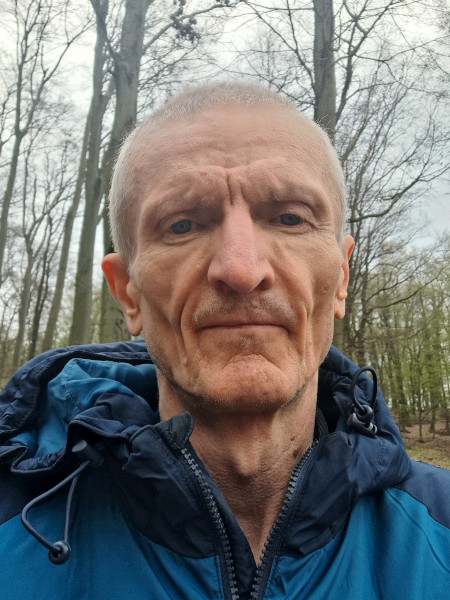
Ivan Kupka is a Slovak mathematician, publicist and language enthusiast. He is an avid reader and the author of two books on language learning. He speaks 6 languages. The number of languages in which he has read at least 10 books is 12. He is a couch potato, but has lived and worked abroad for a year - in France - and likes to frequent second-hand bookshops in Bratislava and Vienna.
Play + ing with basque verb-s
Language: Multilingual
Ongietorri! It takes you 3 years of study to come up with beautiful and funny verbs? Do you want to see how a "didazue", "genezake" or a "dakarkizut" is made? In a moment we will disassemble these intricate Basque verbs into small pieces and play and learn along the way.
Prepare your talk in the gathering.
In this gathering there are people with a lot of experience in giving talks and there are also people who are doing it for the first time. What you want to say is very interesting, for sure, so we are going to work together on the "how". A little bit of body work, voice exercises, maybe you need to breathe a moment to relax? 45 minutes to help your talk go as well as possible. Not speakers (yet) also welcomed!
Iñaki DPB
Musician, actor and performer. Teacher and museum guide in San Sebastian. Content creator talking about art and culture. And yes, he likes playing with the audience!
Latin after Rome: History of the undead language
Language: English, Latin
Latin did not die with the fall of the Roman Empire in 476 AD—it "died" earlier, in Cicero’s time, when it ceased evolving and became an "undead" language, preserved rather than naturally spoken. From that point on, authors had to learn classical Latin deliberately, keeping it alive in a unique, timeless form.
Throughout history, Latin thrived beyond the empire’s borders, thanks to monks copying ancient texts and influential leaders like Charlemagne promoting its use. It became the universal language of medieval Europe, the official tongue of the Catholic Church, and an international language of science, literature, and diplomacy. Latin spread far and wide, reaching regions such the Polish-Lithuanian Commonwealth, Scandinavia, and even the Americas. Notable figures like Bede, Copernicus, Newton, Galileo, Janicki, and Sarbiewski all contributed to its enduring legacy. Today, many enthusiasts keep Latin vibrantly alive.
Join this fascinating 1500-year journey to explore how Latin survived its own death and discover why it continues to inspire learners and speakers around the world.
Speak Latin like the Romans!
Language: Latin, English
This Latin crash course is a great introduction to the language of ancient Rome. You’ll make your first steps in Latin and learn basic phrases with engaging learning techniques and approaches.
No previous language knowledge is needed. You will memorise neither declensions nor conjugations. On the contrary, you will learn to use the context to help you understand the text you read.
Jan Oko
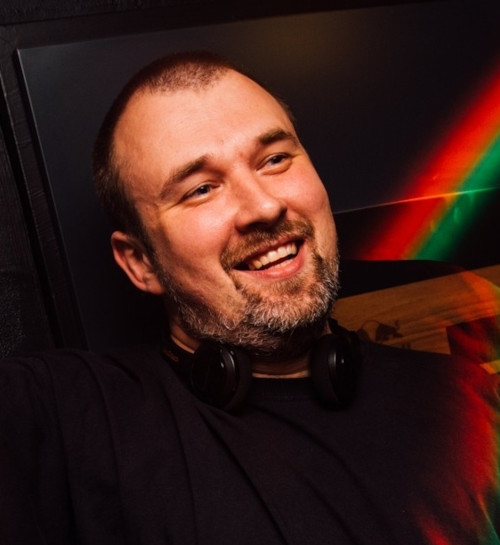
Jan Oko is a passionate polyglot, educator, and content creator with a deep love for languages, history, and literature. He teaches English and Polish as foreign languages and promotes "living methods" for learning Latin, making the ancient tongue more accessible to modern learners. Jan creates Latin-language content and hosts the Polish with John podcast, helping learners master Polish. He is also involved in a project digitalizing texts for a database of Polish Latin authors. A dedicated fan of Tolkien and speculative fiction, he dreams of one day writing a science-fiction novel in Latin.
Low Saxon – Bridging gaps between Germanic languages
Language: English
Being from the East of the Netherlands, I was always surrounded by the Low Saxon Language in one way or another. Visiting the Polyglot Gathering for the first time in 2024 however, I was once again reminded of the fact how little people know about it. And that while the language is present in quite a significant part of both the Netherlands and Germany.
Often being overshadowed by Dutch, Low Saxon does not always get the appreciation it deserves. In this workshop however, you will find out why it is worthy of so much more. Find out how Low Saxon relates to German and Dutch, who its speakers are and why it is important we take action now.
Expect to learn who speaks Low Saxon, what the speakers are like, which different forms the language can take, ways we can improve the current situation, as well as to learn some core Low Saxon words and phrases! Kum zeker langs um te zeen hoe schier ‘t plat proat’n wa nich kan wean! (Be sure to come by to see how beautiful Low Saxon can be).
Jip Derkman
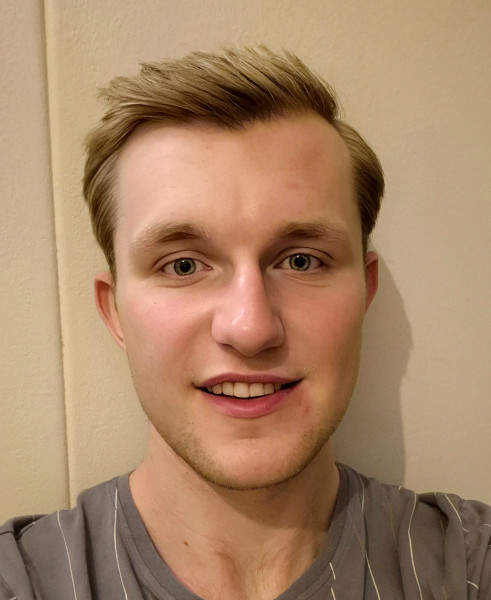
Jip Derkman is a self-taught polyglot from the Netherlands. Learning Russian, his first fully self-taught language, had a great impact on his life, experiencing incredible moments, getting to know new people as well as now working in a Dutch language school for Russian and Ukrainian speakers, and also performing standup comedy in Russian. Originally from the region of Twente, he takes pride in the local differences in culture and language present.
Stockholm Polyglots – From Meetup to Movement
Language: English
How does a small group of language enthusiasts grow into a thriving community and non-profit association?
For those of you who heard my presentation last year, you may remember that I shared the beginnings of Stockholm Polyglots. This time, I’ll take you through our journey since then—what has driven this transformation, and what challenges have arisen along the way.
We’ve gone from our roots on Meetup and being featured in a Swedish TV program about language learning, to our biggest milestone yet: representing our community at Järvaveckan. This is a major public event in Stockholm that brings together politicians and civil society organizations to engage with the public on issues such as diversity, integration, and social inclusion.
Through key moments, struggles, and milestones, I’ll share insights into how a language community can flourish and find its own identity—measured not just by size, but by the strength of its personal connections and its evolving role in promoting inclusion and cultural exchange.
Whether you’re interested in starting your own community or growing an existing one, I hope this talk will offer valuable lessons and inspiration!
Jonatan Haile
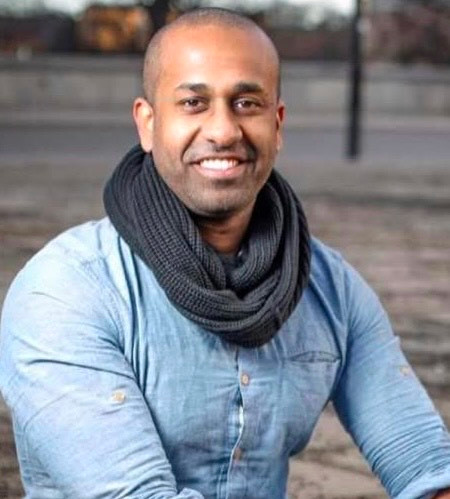
Jonatan Haile is a polyglot born in Sweden who speaks 7 languages: Swedish, English, Spanish, Hungarian, Russian, Tigrinya, and Egyptian Arabic. He has lived and studied in both Granada (Spain) and Pécs (Hungary), experiences that have deepened his connection to languages and cultures. His love for languages is mainly driven by cultural immersion, often inspired by musical artists such as Silvio Rodríguez, Vladimir Vysotsky, and Cseh Tamás. Jonatan works as a medical doctor and regards patient interactions as the most stimulating and fulfilling part of his job.
El arte de la memoria
Language: Spanish
¿Qué es la memoria? ¿Podemos entrenar el cerebro como si fuera un músculo? ¿Existen técnicas eficaces para estimular los recuerdos? ¿En qué se basan?
Desde los albores de la humanidad, poetas, filósofos y oradores han desarrollado diversas estrategias para recordar grandes secuencias de información. Hoy en día, los atletas de la memoria realizan exhibiciones sorprendentes en campeonatos internacionales. Pero, ¿existe alguna relación entre la memoria y el aprendizaje de lenguas?
En este taller exploraremos la paradoja de la memoria y el olvido emprendiendo un viaje a través de la historia. Nos acercaremos a los retóricos griegos, Marco Aurelio, Hermann Ebbinghaus y Jorge Luis Borges. Analizaremos conceptos fundamentales como la economía del lenguaje, la memoria de trabajo y la curva del olvido. También descubriremos las técnicas mnemotécnicas de los hiperpolíglotas, desde Giuseppe Mezzofanti hasta Alexander Argüelles.
Intentaremos comprender cómo influye la memoria en la adquisición de lenguas y, sobre todo, pondremos en juego herramientas que transformen la teoría en práctica.
Jonathan Martínez
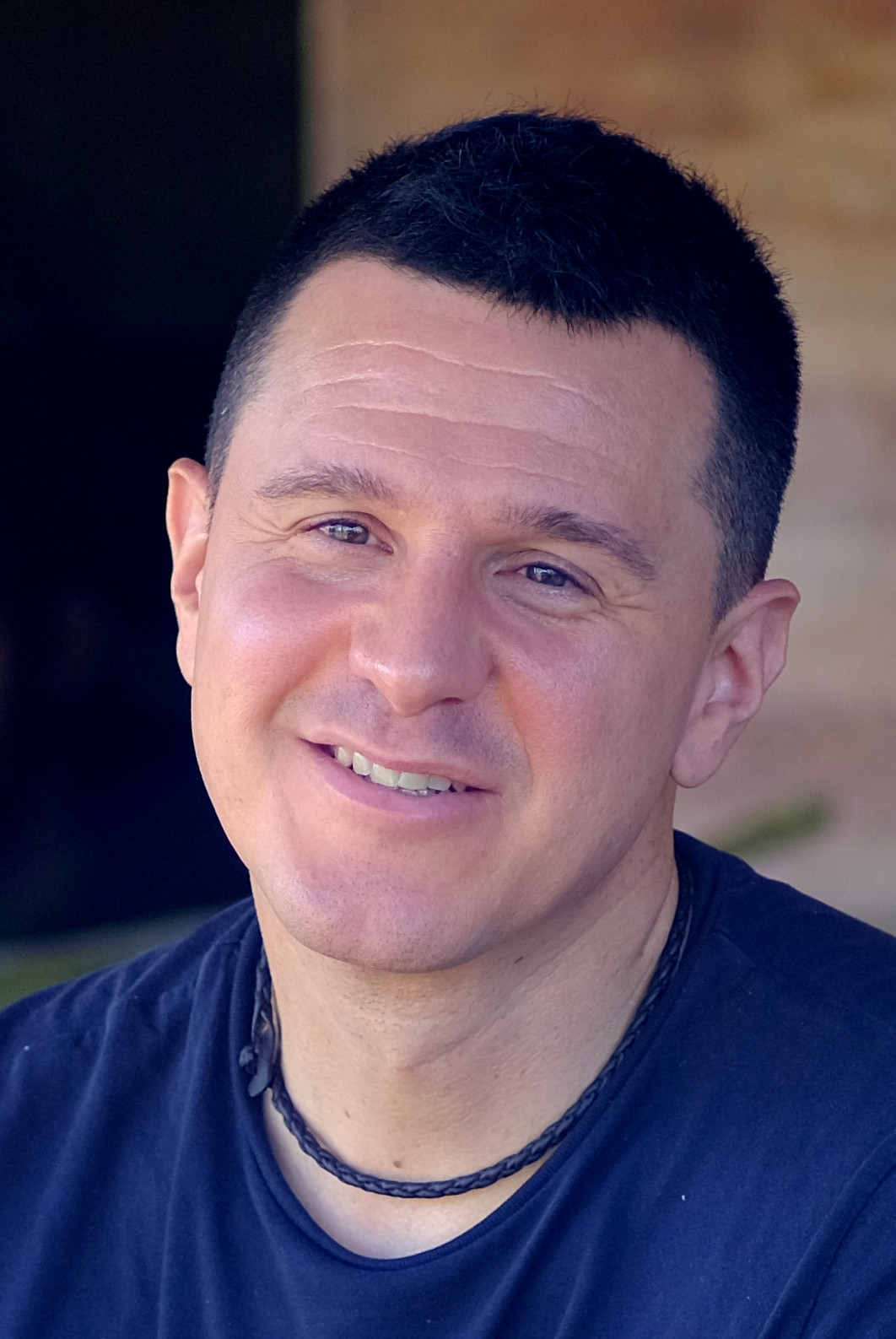
Jonathan Martínez is a communication specialist and writer from the Basque Country. He earned a degree in Hispanic Philology and obtained his PhD in Audiovisual Communication from the University of Seville with a research study on Mexican cinema. He has developed an interest in media analysis, linguistics, and literature. Currently, he is delving deeper into Slavic languages.
The Letters of India
Language: English
What do ancient Indian scripts reveal about the cultures they shaped? In this talk, we’ll take a fascinating journey through the evolution of India’s writing systems—from the ancient Brahmi script carved into stone to the flowing curves of Tamil and the crisp, angular lines of Devanagari. Have you ever wondered why North Indian scripts tend to be straighter and more linear, while South Indian scripts are beautifully rounded? There’s a practical reason for it, but also a mythological tale that’s just as intriguing.
Indian alphabets are more than just symbols—they reflect the pluralistic philosophy that’s at the heart of India. Across the subcontinent, diverse languages and scripts have coexisted for centuries. Just take a look at an Indian currency note—it’s a living testament to this diversity, with multiple scripts coming together on a single piece of paper. (By the way, we’ll play a little game during the talk, and there’s an artistic prize waiting for the winner!)
The arrangement of Indian alphabets is something truly special, and we’ll explore that together. Many polyglots admire the elegance and logic behind how these scripts are structured. There’s even a beautiful philosophy woven into the letters: consonants are like “bodies,” while vowels are the “souls” that bring them to life. It’s a system that’s both transparent and deeply symbolic.
Here’s a little teaser to get you thinking: Can you guess the approximate age of the oldest Indian script? (Hint: it’s older than you’d imagine!)
Whether you’re captivated by the artistic beauty of these scripts, their cultural connections to sound and identity, or the philosophies they hold, this talk will leave you with a whole new appreciation for the elegance and variety of India’s letters.
Joshua Balata
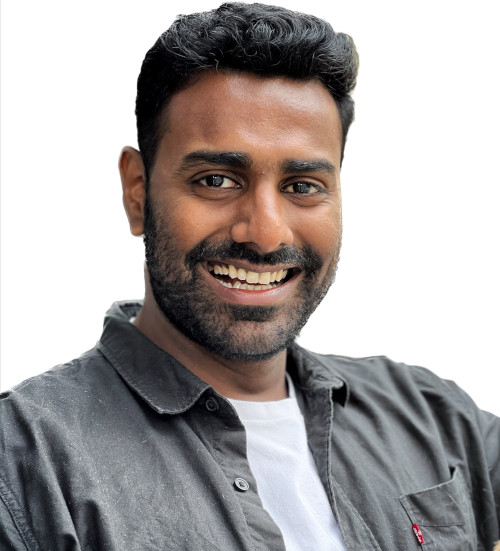
I was raised by language lovers who spoke to me in various Indian languages as a child. It came naturally to me to pick up languages as my parents did it so effortlessly.
I moved to France for business studies and currently work in Paris in the world of Data (I mean Indian dude and computers – the apple doesn't fall far from the tree!)
Since moving to Europe, I've taken a fond liking to make Indian food, calligraphy and video making. This year will also be my first at the Polyglot Gathering where I join by association the #FitGlot community (bring your running shoes jic!).
Why Languages Learners Are Better Than AI
Language: English
With all the buzz around AI and large language models, it’s easy to assume that machines are already surpassing humans in language ability. But here’s a bold claim: even beginner language learners often outperform AI in key linguistic tasks. As a computational linguist, I spend my days teaching computers how to understand and use language—and I constantly run into problems that humans, even with just a little exposure to a new language, can solve effortlessly. In this talk, I’ll walk you through real-life examples where human intuition, context awareness, and a sense of meaning leave AI in the dust.
Your brain, despite not being a supercomputer, is doing something truly remarkable every time you learn a new word or parse a tricky sentence. Whether you're a polyglot or just starting your language journey, this talk will give you a renewed appreciation for your own linguistic abilities—and maybe a little healthy skepticism about what AI can (and can’t) do.
Judith Meyer
Judith Meyer is a computational linguist, author, and founder of the Polyglot Gathering. She has written several books for language learners, including the popular Script Hacking series and Teach Yourself Complete Esperanto. When not teaching computers how to process languages, she is studying Croatian and Greek, and she is an activist with DiEM25.
Paper Magic for Polyglots: Simple Books and Pop-Ups for Language Learning and Teaching
Language: French, German, Spanish
Technology has made language learning so much easier. And there’s still a place for tactile learning which engages the brain in a different way. Join me for a hands-on workshop where we’ll create simple books, pop-ups and other magical paper structures. These can be great tools for language learning or teaching—helping with tricky grammar, conversation scripts or vocabulary that just won’t stick. Or, they can be a fun and creative way to celebrate languages: perhaps a pocket-sized book with those exquisite untranslatable expressions, a selection of Persian poems or Finnish song lyrics, or your favourite words in various languages. En français / Auf Deutsch / En español. No problem if you don’t understand all the spoken instructions—it will be visual. No art experience required!
Kate Battle

Based in Montreal, Kate has been working as a book artist (bookbinding and pop-ups) and language tutor/coach for over 20 years. She has always enjoyed bouncing between art and languages, but the sweet spot is when the two come together—whether in her artist books, handmade props for teaching English to adults, or second-language art workshops with kids in schools. Kate loves the thrill of giving workshops in different languages: most are in French or English, with occasional exciting opportunities in German or Spanish. (Oh, and once in her far-from-fluent Japanese!)
Artificial meets Human Intelligence: Better language exchanges with the help of AI
Language: English
Tandem is an online language learning community with tens of millions of members from around the world. Our mission is to connect the world through languages.
AI-powered tools are reshaping the way we learn languages. They’re undeniably helpful for studying on your own. But what about language exchange, where the magic happens through genuine connection between real people?
How does AI fit into this deeply human experience? How can humans and AI collaborate to make language exchanges richer, more effective, and more enjoyable?
In this session, we'll share our AI journey at Tandem, explore how we leverage AI to address typical challenges in language exchange, and offer a glimpse into what the future of AI-powered language exchange might look like.
Katie Dang, Michelle Kubitza, Tobias Dickmeis
Tobias is the co-founder and Chief Product Officer of the language learning community Tandem, based in Berlin/Germany. Since launching the Tandem mobile app in 2015, more than 30 million members around the world have joined the community to practice 300 different languages together and learn from each other.
As Tandem’s Language Education Specialist, Michelle applies her multilingual skillset to various projects involving language learning and AI.
Katie is a product manager at Tandem and leads the discovery and implementation of new features and functionalities.
Stretching & Mobility Class
Language: English
Relax, move, and reconnect with your body!
Take a break from all the brainwork and join me for a relaxing and fun mobility & stretching session at the Polyglot Gathering! Whether you're a seasoned athlete or someone who hasn’t stretched in years, this class is for everyone. No flexibility or previous experience is needed — just bring yourself and a willingness to move a little.
This gentle class is designed to release tension from long hours of sitting, improve your range of motion, and help you feel more refreshed and energized. We’ll combine simple mobility exercises with easy stretches, guided by calming music and good vibes.
It's the perfect opportunity to reconnect with your body, recharge your mind, and maybe even learn how to say “ouch, that feels good” in a few new languages!
Wear comfortable clothes, bring a towel or mat if you like, and come ready to smile, breathe, and stretch it out with fellow language lovers.
Krisztina Fehér
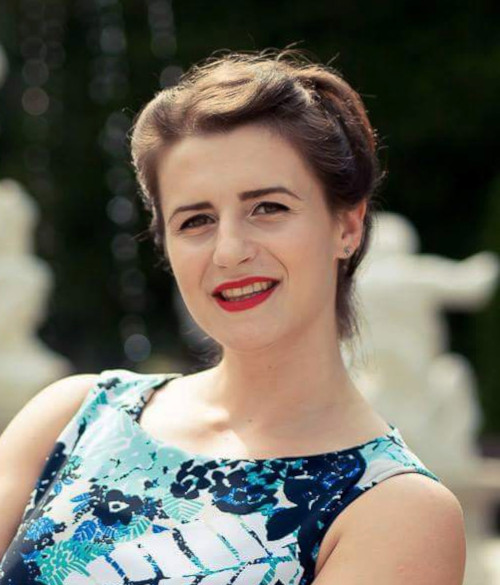
Hi, I’m Krisztina — a certified fitness & aerobic instructor with over 15 years of experience and an orthopedic surgeon by profession.
I’ve always been passionate about movement, health, and the human body. When I’m not in the operating room or leading fitness classes, you’ll probably find me exploring new countries, connecting with people from different cultures, and learning new languages (obviously).
I’m very excited to be part of this amazing community where language meets lifestyle — and to move and stretch together during the event!
Português do Brasil vs Portugal: Diferenças e semelhanças
Language: Portuguese
Será que os brasileiros e os portugueses falam realmente a mesma língua? Às vezes parece que não!
Nesta apresentação, o casal luso-brasileiro Marcela de Oliveira e Leonardo Coelho explicam as principais diferenças entre o português do Brasil e de Portugal, partilhando alguns dos episódios mais divertidos de «barreira linguística» da sua vida a dois.
Leonardo Coelho & Marcela de Oliveira

Leonardo and Marcela are a Luso-Brazilian couple who everyday navigate the differences between their 2 versions of the Portuguese language.
They are also language teachers and avid language learners: Leonardo runs Portuguese With Leo, the biggest YouTube channel teaching European Portuguese, and Marcela runs Francês com a Mar, a podcast teaching French to Brazilians.
Cultivating translingual and transcultural competencies though the use of picturebooks
Language: English
This talk discusses how translingual and transcultural picturebooks develop linguistic competencies and cultivate young language enquirers. It focuses on the production and reception of I want to Speak Ukrainain, a trilingual picture book in English, Ukrainian and Irish that was created in 2022 to facilitate interlingual and intercultural exchange in Irish schools in the aftermath of the Russian invasion of Ukraine.
Our talk will introduce the text which was written in both the Roman and Cyrillic script and show some examples of its multilingual illustrations. It present the activities that we created to facilitate its use in two multilingual, primary schools, one in Ireland and one in Spain. It describes some of the intercultural, interlinguistic and intergenerational exchanges that took place in our classrooms and shows a few of the drawings and mini-books that our students produced. A respect for, and interest in, the languages, scripts and cultures of others is a necessary requirement for language learning and the conversations that took place in our classrooms all revolved around the intercultural benefits of being a polyglot speaker. They showed how interaction with translingual, picturebooks can bring about a shift in perspective and engender a humanistic, integrative view of language learning.
Lindsay Myers and Erin Becht
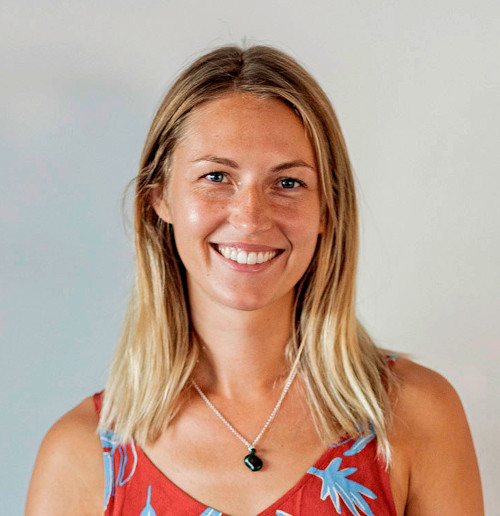
Lindsay Myers is a Lecturer in Italian and Children’s Studies at the University of Galway, Ireland. Her specialisms are Italian children’s literature, picturebooks, children’s literature in translation and the adaptation of children’s books in theatre and film. She is interested in the relationship between words and pictures in multilingual children’s picturebooks and in the playful ways in which these can foster and develop interlinguistic and intercultural competencies. She is the author of two picturebooks for children, I Want to Speak Ukrainian (2022) and Mootsy and the Awfully Big Bite (2020) and an advocate for the child’s voice in children’s literature.
Erin Becht is a PhD candidate in Education at the University of Waikato, New Zealand. She is based in Spain and has over ten years experience as an English, German, and Spanish language teacher. Her PhD project explores the potential of translingual picturebooks in multilingual educational environments. Erin is currently working as a primary teacher at an International school in Northern Spain and enjoys exploring creative ways to support students in developing their linguistic and cultural identities.
Native Esperanto speakers
Language: English
Esperanto is a constructed language, yet Ethnologue says it has about a 1000 native speakers. Is that correct? How can an artificial language with no nation even have “native” speakers? Does their mere existence not defy the assumed neutrality of Esperanto, which is promoted as “everyone’s second language”? And do these people play any special role in the development of the language or community? Come to learn more about this little-known phenomenon from Marek, who is himself a father of three native Esperanto-speaking children, and discuss the topic with fellow Esperanto speakers in the audience.
Marek Blahuš
Marek Blahuš is an IT scientist, Wikipedian and polyglot based in Brno, Czech Republic. In his job in the field of computational linguistics, he is handling millions of words every day, routinely in languages he cannot speak. His areas of interest include text corpora, digital lexicography, terminology extraction, and interlinguistics. Searching for patterns in natural phenomena is his life-long passion, as demonstrated also in his long-time hobby, genealogy. Marek is married and a father of three bilingual children (Czech and Esperanto).
5 Fun and Creative Ways to Improve Your Vocabulary
Language: English
Do you want to expand your vocabulary but are tired of boring conventional methods? Are you looking for ways to unleash your true, not-so-serious self in the target language, with or without others watching? Are you stuck in a plateau and want to motivate yourself again? Then this talk is for you! We’ll talk about five fun, free and creative methods you can use to improve your vocabulary and look at some examples together. Suitable for learners of all languages, especially Spanish, German, Greek, French or Hungarian, who feel stuck getting past beginner (or intermediate) level. Let’s get unstuck together!
Maria Spantidi
Maria was born and raised in Greece. At the age of 20, she caught the language learning bug while testing a new language learning website. She went on to learn several languages by taking on fun and creative challenges. A language learning bet with herself prompted her to move to Germany, where she now lives and works, using German, a language she learned completely for free. Her book "Fluent For Free" inspired many language learners and some famous polyglots to learn and teach languages more effectively.
Guia d’aprenentatge de llengües minoritzades | Guia de aprendizaxe das linguas minorizadas
Language: Catalan, Galician, English
A través de dues històries personals amb el gallec i el català, volem fer una aproximació a com és i què significa aprendre llengües minoritzades (que no minoritàries!). Són llengües que sovint passen desapercebudes, però que, com totes les llengües, obren portes a mons i persones que altrament no hauríem pogut conèixer. Som dos neoparlants, apassionats per llengües i us volem encomanar el nostre amor al gallec i al català. Si estàs aprenent català, gallec o una altra llengua minoritzada, fa temps que en volies aprendre una o simplement és un tema que desconeixes i t’interessa, vine a parlar amb nosaltres!
A través de dúas historias personais co galego e o catalán, queremos achegarvos aos temas de como é e que significa aprender linguas minorizadas (que non minoritarias!). Son linguas que a miúdo pasan desapercibidas, mais as cales, como todas as linguas, abren portas a mundos e persoas que doutro xeito non teríamos coñecido. Somos dous neofalantes, apaixoadas de linguas e gustaríanos transmitirvos o noso amor polo galego e o catalán. Se estás a aprender galego, catalán ou outra lingua minorizada, levas tempo querendo aprender unha delas ou simplemente é un tema que descoñeces e che interesa, vén a falar connosco!
Marilena Opferkuch, Kuba Wysocki
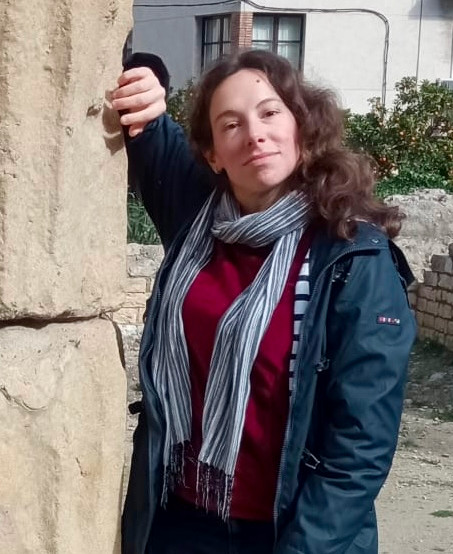
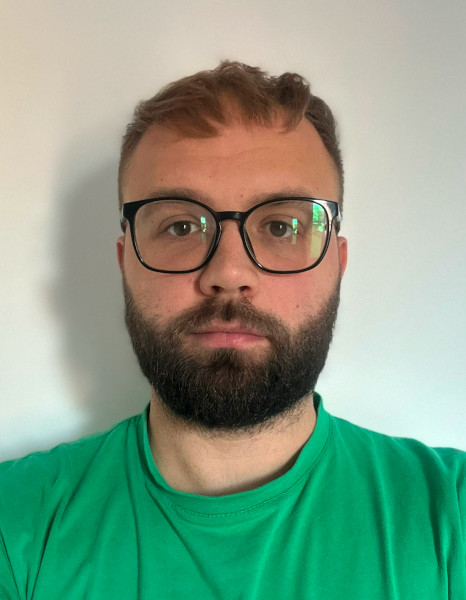
She was born in Austria and studied Galician at a university in Germany. Then she spent a year as an Erasmus student in Vigo and moved back a few years later, even though now she lives in Barcelona.
As a translator and interpreter she works with the Galician language, plays the tambourine in a Galician music group and visits the “Terriña” whenever she can.
Born in Poland and settled in Catalonia since 2018, language rights defender, especially in Spain. Interested in dolor de llengua (language grief) and how IA can help create resources for minoritized languages. He learnt Catalan by immersion (from abroad) and he studies it now at the university. He also studied Galician, Basque, Aragonese and Occitan.
Falares Brasileiros: Cultura Regional e Linguagem
Language: Portuguese
É sabido que o português brasileiro se distingue do português europeu em vários aspectos: do ponto de vista fonético, ortográfico, sintático e no seu vocabulário, enriquecido pelas culturas indígenas, africanas e de migração europeia, oriental e asiática. Trata-se, por um lado, de um idioma nacional que se diferencia do idioma-matriz e, ao mesmo tempo, de variantes regionais faladas e culturalmente vividas diferentemente no país. O enfoque de minha apresentação está na articulação cultural destes falares regionais e na discussão linguística que daí resulta: Bahia, Minas Gerais, Brasil Central, Amazônia, Nordeste, Rio de Janeiro, São Paulo e Rio Grande do Sul. Os exemplos audiovisuais serão discutidos em suas manifestações culturais através da oralidade assim como em sua escrituralidade, da inclusão de elementos regionais na língua oficial (desde a topografia até expressões idiomáticas) assim como da exclusividade de termos e expressões locais consideradas intraduzíveis, mas que encontram correlatos em outras variantes locais e na língua oficial. Essas duas vertentes indicam uma valorização dos falares regionais e da memória das culturas locais, situando-as num contexto mais amplo do português brasileiro oficial e da importância de sua intrínseca diversidade, além de fomentar a discussão da traduzibilidade de falares regionais.
Marina Corrêa
Marina Corrêa is lecturer at the University of Vienna, Austria. She studied musicology, German and romance studies. Her main interests lay in language as an aesthetic communication (PhD in a comparison between music and word expression), language and the translation of cultures, as well as the vernacular de-hierarchization.
Melodies of Ukrainian: A Singing Workshop
Language: English, Ukrainian
Curious about Ukrainian language and Ukrainian music? Want to sing and pick up some language along the way? Come join me for an interactive workshop where we’ll explore songs from Ukraine - some you might know, some you definitely don’t – and sing together as we go.
We’ll look at music from different times: old folk songs, hidden gems, beloved classics, and some tracks from recent years. I’ll share a bit about the stories behind them.
We’ll also use the songs to learn and practice some Ukrainian – whether it’s new words, pronunciation, or just getting used to how the language sounds. You don’t need to speak Ukrainian or be a singer - we’ll keep it simple and fun. Just bring your curiosity, and let’s enjoy the music together!
Marta Melnyk
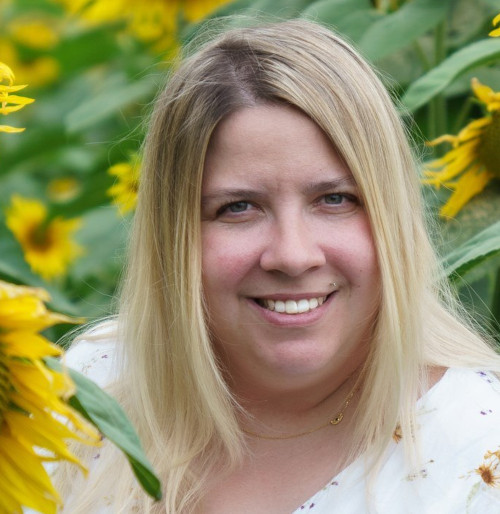
Marta Melnyk is a language lover, teacher, and lifelong learner who has been teaching and speaking multiple languages for years - including Ukrainian, her native language. She enjoys combining culture, music, and language in creative ways that make learning fun and meaningful. With a background in teaching, public speaking, and workshops, she tries to bring energy, humor, and a personal touch to every session. Whether it's through songs, stories, or interactive activities, she loves connecting people to language and culture in ways that stick.
Idiomas en danza: emociones que hablan en movimiento
Language: Spanish
La pieza más importante de la danza es la música.
En este taller físico empezaremos viendo juntos nociones básicas de dos «idiomas de movimiento»: el método Laban de teatro corporal y el lenguaje coreográfico Gaga, creado por Ohad Naharin.
Y después, «hablaremos» con ese vocabulario jugando con libertad con la altura, la textura y la velocidad guiados por la prosodia, los sonidos y el ritmo de 8 piezas musicales cantadas en 9 idiomas.
Ven a contar tus historias políglotas: esta vez, con tu cuerpo.
¡Ven a compartir el wólof, el idioma de la teraanga!
Language: Spanish
En las casas senegalesas se sirve teraanga, o sea,«cálida hospitalidad en raciones generosas».
Nan nga def? es «¿Cómo estás?» en wólof, el idioma de la teraanga, el más hablado en Senegal y presente además en Gambia, Malí y Mauritania.
En la voz de Youssou N’Dour oiremos los sonidos más característicos del wólof, cercanos a los del árabe y el español; saludaremos según nuestra edad y la del otro; contaremos de 5 en 5; doblaremos casi todo el alfabeto; descubriremos 8 «géneros» y disfrutaremos pronunciando palabras como mbalax, baobab, maafe, ceebu jën o bissap.
Descubre el wólof: entra en el mundo de las lenguas africanas por el Oeste.
María de Vera
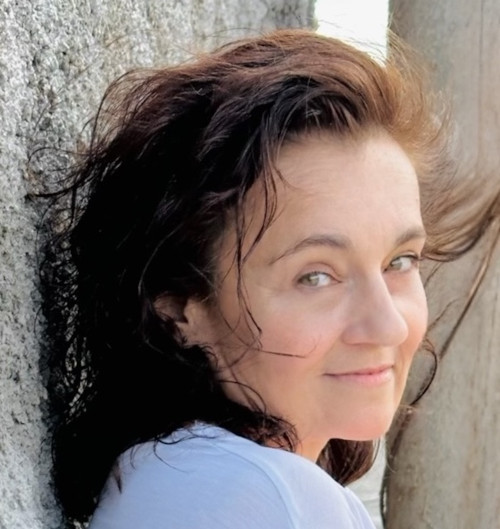
María de Vera is a musical actor (meik.actor) and creative generalist forever in love with languages and imagination. Saltando al elástico is her newsletter about creativity and innovation. Born in Tenerife, Spain, she believes a playful approach to life sparks limitless possibilities for inventiveness and fun. That includes tinkering with all the languages she can sing in. Even Hungarian. More about María at multilingualcreative.com.
Ár var alda: A short introduction to the earliest germanic languages and their literary corpora
To get to know the past, is to help understanding the present. Let us embark in this talk on a journey through the linguistic history of the germanic languages and see what were some of the first attested languages spoken across northern Europe. This is a story of Kings, Queens, Poets, Warriors, Monks, Runes, Dragons, Vikings, and so forth.. I’ll present some of the main first attested languages by showing the literary works and social-cultural contexts in which they were written. We’ll take a look at the people’s behind the stories and history by analyzing the languages and the worldviews embedded in their rich and vast vocabulary. If it’s for instance Old English, Gothic, Old Norse or Old High German you always wanted to hear more about, don’t hesitate in attending this talk and together let’s explore the fascinating legacy of the early medieval world!
Matheus Ventura Lang
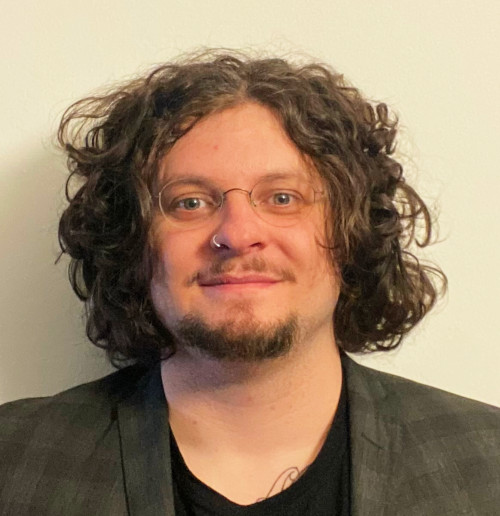
Matze is a Carioca-Swabian Hyperpolyglot, Anthropologist and language enthusiast currently located in northern Germany. With a deep interest for language and it’s nuances, he’s pursuing his Masters degree in Philosophy and Scandinanvian Studies with a focus in Medieval studies. With his passion for etymology and historical linguistics Matze is also a language teacher, helping people around the world to perceive language by the optic of history, culture and philosophy.
Учење на твојот прв словенски јазик по 40 години: зошто македонскиот јазик?
Language: Macedonian
Словенските јазици можеби се полесни отколку што мислите. Дојдете и откријте ја неверојатната моќ на македонскиот јазик, најлесниот словенски јазик.
Matias Barmat
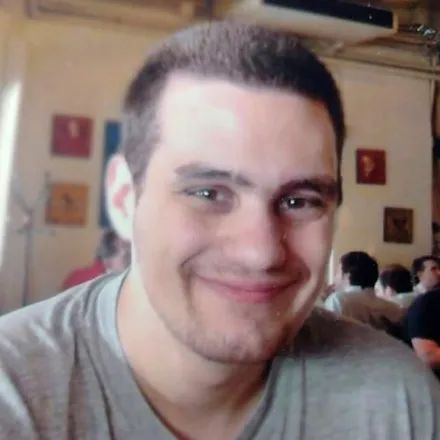
Systems analyst and majored in Journalism. Director of Recruitment for HYPIA (The International Association of Hyperpolyglots).
Lingvaj homaj rajtoj
Language: Esperanto
Ĉu lingvaj rajtoj estas homaj rajtoj? Ĉu vi scias, ke lingva subpremo povas esti formo de homrajta malrespekto?
En ĉi tiu prelego ni malkaŝos la ofte ignoratan flankon de homaj rajtoj: lingvaj rajtoj. Ni difinos kio estas homaj rajtoj, kiuj devas garantii ilin, kiuj el ili plenumiĝas lingve kaj tiel ni plukonsciiĝos pri kial lingva diskriminacio estas danĝera kaj kial lingvoj gravas eĉ por homaj rajtoj.
Michael Boris MANDIROLA
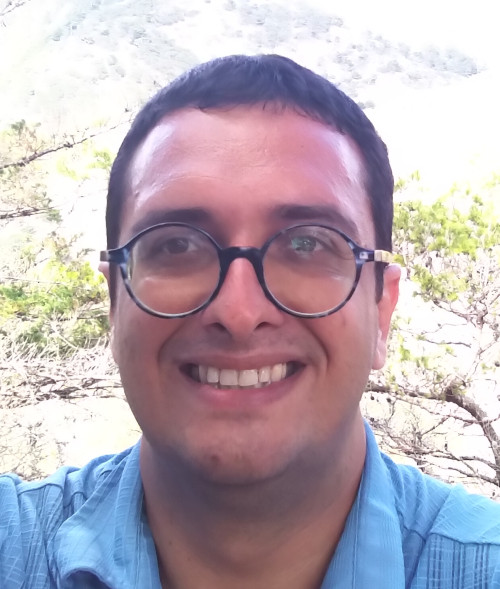
Michael-Boris MANDIROLA is the former president of the World Esperanto Youth Organisation and he is still active in several Esperanto organisations, from the local to the international level, as well as in Euro-federalist ones.
He has worked and studied in Piedmont, Wales, Catalonia, Silesia and Occitania; thanks to these experiences and Esperanto activism he developed a particular attention towards language diversity and language rights.
By the way he graduated as a computer engineer from the Polytechnic University of Turin and is working in the aeronautical industry, but that’s less related to human languages.
Language Politik en Europa – una discussion multilingue expérimentelle
Language: Multilingual
Is it fair that English is the de facto lingua franca in Europe? ¿Es adecuado que la Unión Europea tenga actualmente 24 lenguas oficiales? Sollte Esperanto die Verkehrssprache in Europa werden und alle Kinder Esperanto als erste Fremdsprache lernen? Quel rôle devraient jouer les langues nationales, régionales et minoritaires à l’avenir ? O l’intelligenza artificiale risolverà il problema da sola? Nous souhaitons discuter de ces questions ensemble comme polyglottes – y cada uno puede contribuir en una lengua que muchos entiendan y en la que se sienta cómodo. Außer Englisch waren beim letzten Polyglot Gathering übrigens die vier meistverstandenen Sprachen Spanisch, Französisch, Deutsch und Italienisch. Ma forse ci saranno anche abbastanza partecipanti che capiscono il russo, il portoghese, il polacco o l’esperanto. If we polyglots all make an effort to speak slowly and clearly at A2/B1 level, most participants will be able to follow the discussion easily – tout comme les Norvégiens et les Suédois ou les Tchèques et les Slovaques peuvent bien communiquer dans leurs langues maternelles ! This is where passive foreign language skills come into play, without having to be able to express yourself in that language. ¡Si puedes leer este texto, nuestra discusión no será un problema para ti!
Michael Patscheke
Michael Patscheke, *1967, is a language enthusiast from Germany. His main interest is comparative grammar and etymology. He started learning mainly Germanic and Romance languages as a hobby as a high school student and has been fascinated by the links between languages ever since. Apart from German, he is fluent in English, French, Spanish and Italian and has basic knowledge in several other languages – especially when it comes to the structure and grammar.
Divina Commedia: Lettura del Primo Canto dell'Inferno
Language: Italian
La Divina Commedia di Dante Alighieri è probabilmente l’opera più importante e maestosa di tutta la letteratura italiana. Molte parole inventate da Dante ed apparse per la prima volta in quest’opera sono entrate nell’uso comune e molti suoi versi sono diventati proverbiali.
In questa lezione leggeremo insieme il Canto di apertura della Divina Commedia, immergendoci nel contesto storico e culturale dell’epoca, ma soprattutto scoprendo quanto le parole di Dante rimangano in realtà attuali anche al giorno d’oggi. Infatti, nei versi che leggeremo, un ruolo importantissimo è ricoperto dalle emozioni e dai sentimenti umani, che restano invariati in ogni epoca e che i grandi poeti come Dante ci aiutano a comprendere e ad esprimere, regalandoci le parole.
Non lasciatevi intimorire dalla apparente complessità dei versi: ogni passaggio sarà spiegato in modo chiaro e accessibile, rendendo la lezione adatta a chiunque abbia una buona comprensione dell’italiano.
Se non vi siete mai avvicinati a Dante, questa è un’opportunità unica per scoprire la bellezza della sua opera ed approfondire la conoscenza della cultura italiana. Se invece questi versi vi sono già familiari, vi invito comunque a partecipare. Sono sicuro che insieme riusciremo a cogliere nuove sfumature e significati inattesi.
Michele Galasso
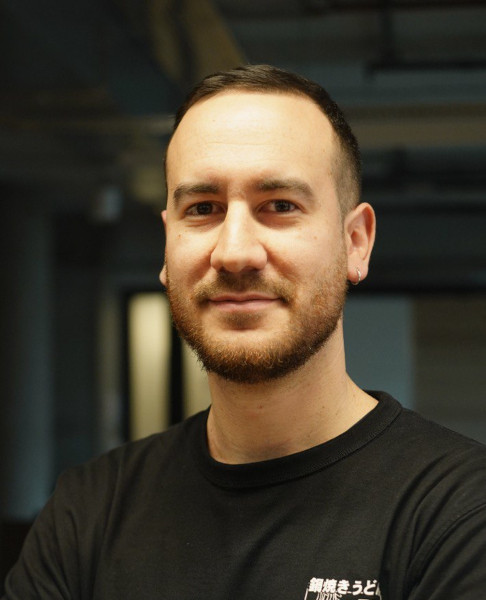
Michele is a young scientist from Italy. He combines a strong technical background, holding a MSc in Engineering Physics and a PhD in Materials Science, with a variety of hobbies mostly related to the humanities. Beyond his work in an AI company, Michele is an accomplished saxophone player, a passionate reader and a language enthusiast. Over the past 10 years, he has lived in Sweden, Russia and Czechia, becoming fluent in the local language of each country. During this time, he has deeply immersed himself in their cultures, all while proudly representing and celebrating his Italian heritage.
How Polyglots Can Benefit from A Platform for Multilingual Free Reading and Vocabulary Learning
Zeeguu.org is an open-source research project that aims to provide intermediate language learners with personalized reading recommendations and vocabulary practice.
Zeeguu scans the Internet daily and indexes thousands of articles and blog posts in eight languages in order torecommend to every learner those materials that are both interesting and at the right difficulty level. The Zeeguu Reader provides one click support for translation and pronunciation. By observing the words with which the user struggles, Zeeguu builds a model of the learner’s knowledge which is then used to recommend vocabulary exercises and further reading.
For polyglots the platform can be useful because it can help practice and maintain their various languages while reading about the topics of interest that they would like to read about anyway.
During the workshop I will start with a brief presentation and demo of the web application. Then, the audience will try it out individually or in small groups. Finally, we will end with a discussion in which we will address the questions, ideas and feedback from the participants. If time allows and there is interest, I will also present some of the data-driven insights derived from the interactions of existing learners with the platform.
Mircea Lungu
Mircea Lungu is an associate professor of software engineering at the IT University of Copenhagen in Denmark. He recognized the need for Zeeguu while living in Switzerland and trying to practice his German by reading Neue Zürcher Zeitung, only to realize that most of the articles were too difficult for him. Since then, he has moved to two more countries. These moves, along with his early education and extended family, are the reasons he speaks the following languages (in decreasing order of fluency): Romanian, English, Italian, French, German, Spanish, Danish, and Dutch.
Language Competence and Access to Coping in New-cultural Environments among Polyglots. A presentation of my Master's Thesis.
Language: English
Foreign languages have been an important subject of interest of individuals for a long time. There exist many historical examples of individuals who mastered multiple languages and were passionate and motivated about learning them. Nowadays, such individuals are defined as polyglots and are characterised by their high level of motivation, enthusiasm and passion for studying, improving and practising languages. Even if some research in the areas of neuropsychology and motivation of polyglots exists there exists a research gap in the investigation of polyglots and their adaptation to and functioning in new-cultural environments. The purpose of this study is to seek to fill this research gap and to address two research questions. Firstly, it is examined to what extent language competences impacts polyglots’ awareness, understanding and adjustment to different cultures. Secondly, it is questioned which concrete language competences are relevant in this respect. The model of sociocultural adaptation was chosen as the main theoretical concept of this study where interaction with locals, understanding of cultural differences and obtaining of cultural knowledge are essential factors for an individual to adjust to a different culture. The present study is based on a qualitative approach where six polyglots from five different countries were interviewed, after which the interviews were hermeneutically interpreted by applying the sequence analysis approach. The results of the present work demonstrate that multiple language competence of the participants play a pivotal role in their awareness, acceptance and adaptation to different cultural encounters. Furthermore, profound knowledge of vocabulary, communication with locals in the local language and understanding of the contexts behind some grammatical and lexical phenomena are the most essential factors that positively influence polyglots’ ability to coping and functioning in different culures. Overall, even if the present study could be considered as a first step to investigate the relationship between polyglots’ linguistic competence and sociocultural adaptation it is encouraged to conduct further research in this context. For instance, it would be worth questioning how polyglots’ language learning approaches could impact their ability to adjust to and function in different cultures.
Multilingual concert with Helga
Language: Multilingual
During this max. 1 hour long concert, I would like to perform songs in different languages and different styles such as Latino, jazz, Bossa Nova and many others. Come and have fun!!!
Olga Koeva (Helga)
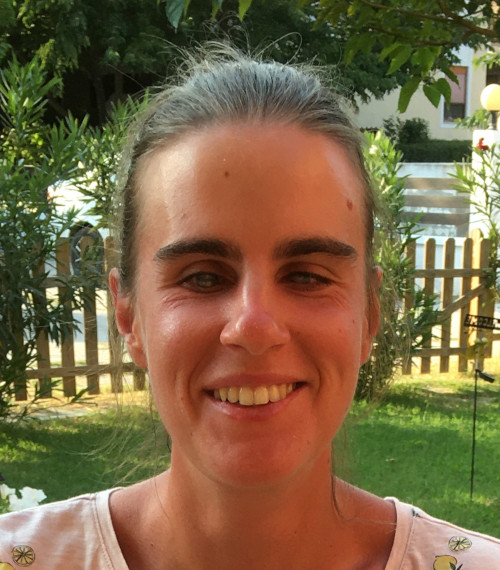
Olga Koeva is a Bulgarian hyperpolyglot and a professional organist and pianist. She has a Bachelor's degree of sacred music and a master's degree of organ improvisation. Additionally, Olga has a Bachelor's degree of International Relations and Management at the University of Applied Sciences in Regensburg, Germany. Recently, she successfully completed her Master's degree of Management of Intercultural Studies at the same university and obtained a Grade A (1.0) for her Master’s Thesis.
Olga Koeva has always been interested in studying, practising, analysing and improving languages. Olga speaks 13 languages fluently and is still improving them by reading literature in all these languages, listening to radio and communicating with her friends.
Kreyòl Ayisyen 101
Language: French
Let’s make a quick stop in the Caribbean during this workshop! Not only will you learn about Haitian Creole, but also the sociocultural and historical background of the language.
Through interactive activities, you’ll discover about the basics of Haitian creole: alphabet, pronunciation, key phrases and more!
Whether you’re a complete beginner or you have some knowledge of Creole, this session will be a great opportunity to get a new perspective on Creole languages.
No prior knowledge is needed, just your good energy!
Orlynda Vales
Orlynda Vales is a linguistic student and special care counselor, an artist, and a constant learner. Her work experience has led her to explore cultural, linguistic, identity, and foreign language learning issues. Her areas of interest are primarily sociolinguistics and psycholinguistics. It was through her studies in linguistics that she rediscovered her native/heritage language: Haitian Creole. She strongly believes that connecting with others is what builds self-awareness.
Create open language exchange meetings and a thriving community in your city
Have you been looking for language events in your city, but to no avail? Are you tired of "language exchange" being the synonym of "let's all switch to English"? Would you like to have more multilingual practice and multicultural experience between successive Polyglot Gatherings and/or Conferences
If the answer is "yes," then you should take matters into your own hands and create something new! It may seem daunting at the beginning, but if you make the first step, good things will happen :)
During the talk we’ll discuss many ideas and good practices for creating a local language community. My experience is based on over a decade of visiting language meetings in different European cities and my personal involvement in many local multilingual and multicultural projects in Warsaw, including building the largest language exchange community in Warsaw, with 6-8 languages weekly and 20+ languages monthly.
Pablo Koperek
Pablo is a passionate language enthusiast based in Warsaw.
Despite a strong background in IT, he managed to dedicate his life to natural languages and teaching, promoting multilingualism and multiculturalism. The life-changing moment for him was a year abroad in Spain, where he fell in love with Spanish and later with Catalan.
He's been a member of the Polyglot Community since the first Gathering in Berlin in 2014 and in the last decade he taught 12+ languages to hundreds of students, mostly online.
Introduction to African Languages (Hausa & Tiv)
Are you familiar with any African language, literature or cultural history? There are over 2000 languages in Africa divided into four major different language groups. However, in this lecture, I will focus on only 2 languages: Hausa and Tiv from the Afro-Asiatic family and the Niger-Congo family respectively. Both languages are from Nigeria in West Africa.
Hausa language
Since the 12th century, Hausa was written in arabic script, also known as ajami, under Arab and islamic influence. Hausa became written in the Latin alphabet in the 19th and 20th century under British and French influence. It is considered an official language in the northern states of Nigeria. It is also widely spoken in other West African countries such as Niger, Cameroun, Ghana among others. Major international Radio stations like Voice of America, BBC, Radio France International, China Radio International. and Deutsche Welle operate service broadcasts in Hausa language.
Tiv
Tiv, although not widely known as much as Hausa, is spoken in Benue and Taraba states of Nigeria with rich poetry and traditions.
In this lecture, you will learn:
- Vocabulary and basic phrases in Hausa and Tiv and how to introduce yourself
- Benefits of learning African languages
- Historical -cultural interactions with Arabs and Europeans
Patrick Joseph
Patrick Joseph, PhD student in Atlantic History, with strong passion for world languages, culture and history, holds a Bachelor’s degree in International Relations from Tokyo International University, Japan and a Master’s degree in the same field from the University of Azores, Portugal. He is a translator and has previously taught foreign languages in schools. Driven by a deep interest in diversity, languages, cultures, and literature, he seeks to promote knowledge on diversity, foster a greater understanding of Africa’s rich heritage in the world at large.
Le français va très bien, merci
Language: French
Le français est une langue extraordinairement vivante, mais ses représentations publiques racontent souvent une toute autre histoire.
Pourquoi tant d’idées fausses circulent-elles sur son évolution ? Pourquoi associe-t-on si souvent innovation linguistique et déclin ?
Cette intervention présentera le travail du Collectif Tract des linguistes, né d’une urgence : rétablir une vision scientifique, apaisée et dynamique de la langue française face aux discours catastrophistes largement relayés dans l’espace médiatique et scolaire.
À travers des exemples récents, comme la sortie du dictionnaire de l’Académie française après 70 ans de travail, nous verrons comment l’écart entre savoirs linguistiques et représentations sociales façonne notre rapport au français et pourquoi il est essentiel d’y répondre.
Philippe Rendulić
Phil est coach en langues, polyglotte et organisateur d’événements basé à Genève. Il est passionné par l’accessibilité de l’apprentissage des langues et engagé dans des initiatives collectives autour de la linguistique et de l’éducation. Depuis 2024, il co-organise le Polyglot Gathering et l'initiateur du projet pilot Sprachgarten. Il est également membre actif du Collectif Tract des linguistes, qui œuvre pour corriger la diffusion d’idées fausses sur la langue française et valoriser sa vitalité et son évolution permanente.
Expectations vs. Reality when speaking European Portuguese
When you learn a foreign language and do not know how to say something, instead of asking “How do you say [it] in your language?”, you should rather ask: “What would you say or how would you react in a similar situation?” I remember our fellow polyglot Richard Simcott recommending this approach back in 2015.
In this session, I will talk about the importance of this attitude using examples from (European) Portuguese after 9 years of living in Portugal. We will take a look at how our expectations of what we want to say can often differ from the reality of the Portuguese language and the way the Portuguese would say it. We will discuss everyday Portuguese expressions that make this language unique as well as look at some interesting semantic phenomena. During this session you will be able to comprehend expectations and challenges you might face when speaking with native Portuguese speakers, which will make you sound more natural.
Piotr Cios
Piotr Cios, born and raised in Poland. After graduating from Applied Linguistics (English and German) at the University of Warsaw, he moved to the Netherlands to immerse in the Dutch language. Since 2016 he has lived in Portugal, where he has worked in various language-related fields. Currently self-studying Hungarian and Greek. His favourite areas of linguistics are semantics, phonetics and psycholinguistics.
Giocoleria per principianti
Language: Italian
In questo ambiente rilassato e accogliente, imparerai le basi della giocoleria mentre ti immergi nella bellezza della lingua italiana. Unisciti a noi per una sessione piena di divertimento, in cui farai nuove amicizie, riderai e proverai il piacere di acquisire nuove abilità! Preparati a stupire tutti con il tuo talento nella giocoleria e a creare ricordi indimenticabili!
Learn Sinhala Fast: A Crash Course for Beginners
Language: English
This crash course is designed for complete beginners who want to quickly pick up the essentials of Sinhala—whether you're traveling to the beautiful island of Sri Lanka, reconnecting with your roots, or just curious about this beautiful language. Learn how to greet, introduce yourself, ask simple questions, and understand the basics of Sinhala pronunciation and structure—all in a clear, friendly, and practical way.
Prasanna Deshapriya
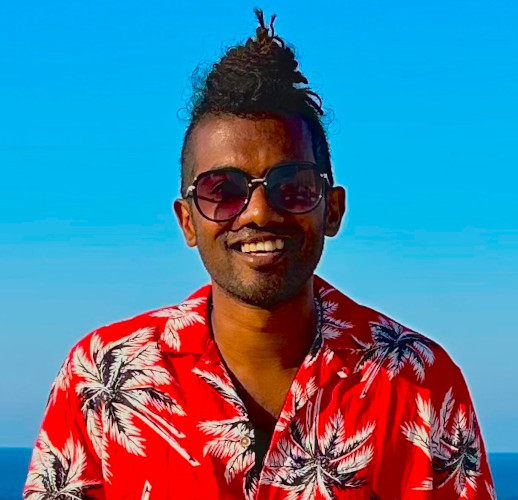
Prasanna Deshapriya is a polyglot juggling 7 languages at different levels. This time, he will get you started on juggling for real (no pun intended) at the PG 2025. He himself was a beginner few years ago and he learned juggling at the PG 2022 in Teresin, Poland. This time he is back at the PG to share his recent passion with all the participants, following a successful first edition of "Juggling 101" conducted in French last year in Prague.
Sign Polyglots? Multilingualism in Signing Communities and Diversity of Sign Languages
Language: English, International Sign Language
Do sign language polyglots exist? If so, how does this "sign polyglotism" work? According to the latest edition of the Internet resource "Ethnologue: Languages of the World", about 160 sign languages have been identified throughout the world so far. Signing communities include both deaf and hearing individuals. Most of the members in deaf communities are bimodally bilingual – they usually have a good command of their local sign language and a spoken language of the surrounding hearing community. Nowadays, due to increase in international tourism and popularity of video content in social media, deaf people have more possibilities to learn sign languages other than their own one, since foreign sign languages are usually not included in school curricula. In international contexts, International Sign, a sign language pidgin, is used. In this talk I want to elaborate on these topics related to multilingualism and language contact in signing communities.
Rafał Darasz
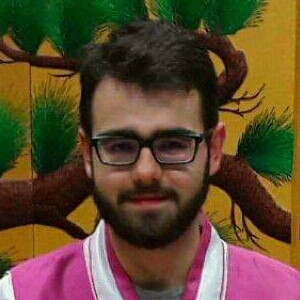
Rafał is a linguist and a language enthusiast from Poland. He is currently a PhD student specializing in sign linguistics. He's got an MA in Baltic Philology, Sinology and Polish Sign Language Philology. He’s been interested in language learning and linguistics since middle school and has studied many different languages, including sign languages. One of his fields of interest is language comparison. He is also fond of music, especially singing, but he also plays a little bit of guitar and ukulele.
The Language Bubble
Language: English
Looking at the bubbles and echo chambers we create in our own world. How does this affect our learning? How does it affect perceptions? What can we stand to achieve? And what can we stand to lose? From planning to learn, learning and using languages, we all create our own language bubbles. Let’s think about them together.
Richard Simcott
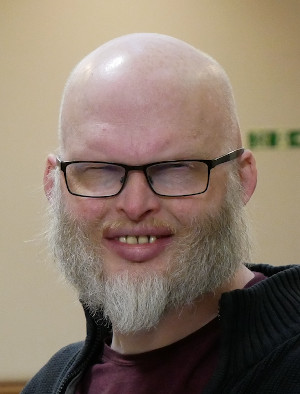
Richard Simcott is a British polyglot, who has studied over 50 languages. HarperCollins described him as one of the most multilingual people in the United Kingdom, and the Goethe Institute gave him the title Ambassador for Multilingualism.
He has many years of consulting experience using languages with diverse clients and offering his expertise on multilingual and multinational projects.
He is the original founder of the Polyglot Conference and The Language Event and manages a popular Facebook page called Speaking Fluently.
Make Friends, Not Flashcards: How Bilingual Communities Can Hack Fluency
Language: English
What if the secret to fluency wasn’t apps, grammar drills, or YouTube videos, but just making real friends who can’t not speak your target language? In this talk, I’ll explore how bilingual communities, like the one I co-founded, El Puente, can create the perfect storm for language acquisition through consistent, low-pressure contact with native speakers and a culture of mutual feedback.
We’ll look at how these kinds of communities essentially force fluency by embedding you in an ecosystem where you speak, write, listen, and live the language, without moving abroad. I’ll share stories, structures, and tools that help facilitate authentic connection: texting habits, accountability buddy systems, speaking challenges, collaborative content creation, live events, and more.
This isn’t a sales pitch. I’m not here to push my program. I’m here as a linguist, accent nerd, and community builder who’s seen firsthand how social immersion can transform intermediate speakers into confident, expressive humans in their target language.
Come for the strategies, stay for the voices. (Yes, I’ll be doing some impressions.)
Ruben Eli Adery
Ruben Adery, a distinguished language acquisition expert and dialect coach based in Los Angeles, has revolutionized the art of pronunciation and accent mastery across five languages: English, Hebrew, Spanish, Portuguese, and Italian. With academic degrees in Spanish and Linguistics, his unique methodologies stem from a deep passion for languages, fueled by extensive travels and immersive experiences in countries like Argentina, Brazil, and Israel. Ruben's exceptional ability to imitate numerous regional accents and his innovative strategies have empowered language learners, performers, and educators in over 50 countries to achieve native-like fluency. His approach, which tailors coaching to leverage students' native linguistic patterns, includes engaging exercises designed to transform pronunciation and enhance confidence in any language. With nearly 15 years of teaching experience, including a Fulbright scholarship in South America, Ruben has become a beacon for those seeking to perfect their language skills, ensuring clarity, authenticity, and connection in their communication. Join him to discover the joy of seamless expression and unlock your full potential in the global language community.
Break the Ice in 10 Languages!
Language: Multilingual
Every language has a secret phrase that instantly connects you with native speakers. In this workshop, you’ll learn ice-breakers in 10 languages—expressions that make locals smile and engage with you. Join us for a fun, interactive session to start conversations with confidence!
Ruslan Kokorin
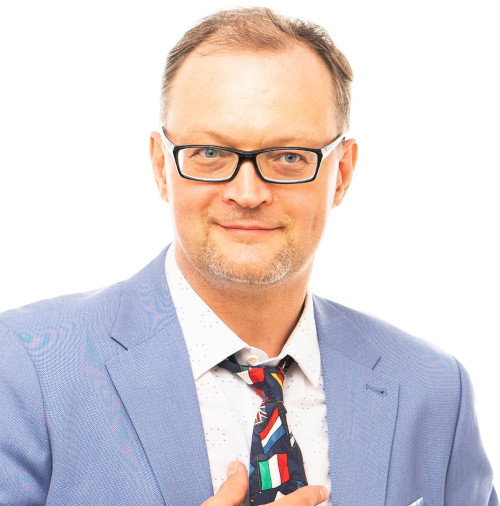
Ruslan Kokorin was born and raised in Russia. From 1998 to 2015, he lived in the UK and Ireland and now resides in Cyprus. He runs an online language school for Russian speakers learning English. A passionate language enthusiast, Ruslan loves connecting with people through language.
Multilingual Event Moderation – Ho to switch from one language to another
Switching between languages can be powerful— but also tricky. How do you keep it natural, clear, and engaging? Whether you’re a speaker, moderator, or bilingual communicator, mastering code-switching is key to connecting with diverse audiences.
In this dynamic session, we’ll explore:
What is code-switching? Why bilingual speakers switch languages and how to use it effectively.
Challenges on stage Avoiding language interference, forgetting key vocabulary, and keeping a smooth flow.
Techniques for seamless switching Mental preparation, pacing, visual cues, and transitional phrases like:
“And now, let’s switch to [language]...”
Best strategies for multilingual audiences When to fully translate, summarize, or switch naturally.
To make it practical, we’ll end with a live challenge where participants can try switching languages in real time.
Speaking multiple languages isn’t about perfection—it’s about connection.
Join my workshop and gain the skills to switch with confidence, engage global audiences, and make multilingual speaking your superpower.
Róbert Černák
Founder and CEO of Pro-Staff company, specializing in personnel management, networking and consulting. He is fluent in multiple languages (English, German, French, Italian, Polish, Russian, Czech, Slovak...) As a language mentor, he guides individuals, especially teenagers, in overcoming linguistic challenges and discovering the joy of learning foreign languages. As a trainer, life coach and motivational speaker, he encourages others to find the courage and motivation to pursue their dreams. His passion for communication and art is reflected in his work as master of conferences, actor, and lyricist. He believes in the power of human potential, collaboration, and continuous learning. His goal is not only to grow as a professional but also to help others on their journey to success.
Vous kiffez le français?
Language: French
Envie de parler comme un vrai Parisien et d'ajouter un peu de fun à votre français ? Cet atelier de 45 minutes vous plonge dans l'univers dynamique et coloré de l'argot français ! Découvrez les expressions les plus populaires utilisées par les jeunes et dans la vie quotidienne, de « Ça roule ? » à « Ouf ! ».
À travers des jeux de rôle interactifs, des quiz amusants et des explications simples, vous apprendrez à intégrer l'argot dans vos conversations. Vous saurez comment exprimer vos émotions, faire bonne impression et comprendre l'argot dans les films et chansons françaises.
Cet atelier est conçu pour que vous puissiez pratiquer dès le premier jour, avec des mises en situation réelles qui vous aideront à utiliser l'argot de manière naturelle. Que vous soyez passionné par la culture française ou un voyageur curieux, cet atelier vous offrira une porte d'entrée passionnante dans un aspect essentiel de la langue.
Alors, prêt à kiffer le français ? Rejoignez-nous pour un moment fun, décontracté et enrichissant !
SEBASTIEN CAPPELIER
Sebastien Cappelier has been teaching French to diverse audiences for over 20 years, working in France, Mali, the USA, Senegal, and, most recently, at the International School of Prague. He holds a master’s degree in French as a foreign language and is passionate about language acquisition, intercultural communication, and innovative teaching methodologies. Dedicated to fostering engaging and inclusive learning environments, he continually explores new pedagogical approaches. Beyond teaching, Sebastien loves traveling the world, discovering new cuisines, cooking, running, and attending concerts. He is also an avid reader and enjoys learning about history, music, and different cultures through his experiences abroad.
Losing one's nationality: Identity shapeshifting through second-language acquisition
Most people think of nationality as something fixed - and of the world as composed of different nations to which people are born, usually determined by the language their parents speak. Nations are, however, quintessentially modern phenomena - for most of human history, people identified with their village, region or creed, rather than some abstract nation. As late as 1931, over 700,000 people declared their mother tongue as tutejszy (local) on the second Polish census. The interplay between language and national identity is thus not as straightforward as it might seem at first glance, and speaking a language at a native level does not necessarily equal having a nationality. This talk will introduce the audience to the role languages played in the construction of national identities in Central and Eastern Europe and describe how bilingualism was often suppressed in the process and many people forced into a single linguistic/national identity. Lastly, it will chart the personal journey of the speaker through losing national identity, the implications of that process, and how that can be a liberating experience.
Samuel Raus
Sam is a nomadic language aficionado and a library dweller. He has a special predilection for the Balkans (Bosnia and Herzegovina 🇧🇦 especially) though he also aspires to become a Hungarian. He likes to play the guitar and annoy people (not necessarily just by playing the guitar).
Juegos de cartas con la baraja española
Language: Spanish
¿Te gustan los juegos de cartas? ¡La conferencia de políglotas te necesita! Vamos jugar a varios juegos de naipes con la baraja española. Será una buena oportunidad para hacer amigos mientras hablas en español y descubres nuevas palabras relacionadas con los juegos de cartas españolas. Los juegos serán: Cuadrado. Culo. Burro. Mentiroso. Escoba. Continental. Truco. Mus.
Sobre la belleza y la gramática. El caso del español.
Language: Spanish
¿Qué pasaría si la gramática no fuera solo un conjunto de reglas, sino una herramienta para dar significado, color e incluso belleza al lenguaje? En esta charla, exploraremos cómo gracias a la gramática podemos transmitir información para no depender tanto del léxico y así enriquecer nuestro discurso en una lengua extranjera.
A través de ejemplos fascinantes del español, descubriremos cómo pequeños cambios gramaticales pueden transformar el significado de una frase: beber vs. beberse, he roto vs. se me ha roto o busco una silla que es vs. sea verde.
Al final de la charla, tendrás una nueva visión de la gramática, no como un simple pegamento para tu vocabulario, sino como una poderosa herramienta que te va a ayudar a transmitir mejor la información que quieres comunicar.
Sergio Martínez
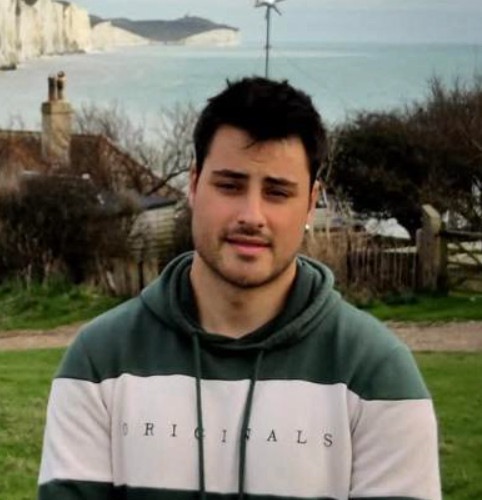
Sergio is a passionate Spanish language teacher at a language school in Madrid. His love for languages led him to pursue a Bachelor’s degree in Linguistics and Applied Languages at Universidad Complutense of Madrid. Fascinated by the logic of grammar and the essence of language, he thrives on exploring how grammar works to make it easier to learn for his students.
Der heimliche Endgegner: Intuitiver Aspektgebrauch in slawischen Sprachen
Wer eine slawische Sprache lernt, ist erst einmal mit dem reichhaltigen Nominalsystem beschäftigt. Doch sobald man denkt, das Schlimmste ist vorbei, taucht der eigentliche Endgegner auf: der Verbalaspekt, und der ist, je nach Sprache und Lehrwerk, erstaunlich knapp dokumentiert.
Slawische Verben werden in zwei Gruppen eingeteilt: die imperfektiven, die eher den Prozess einer Handlung beschreiben, und die perfektiven für das Resultat dieser Handlung. Weil ein Resultat keine zeitliche Ausdehnung hat, kann es keine Gegenwart beschreiben, stattdessen werden die perfektiven Verben auch mit Futurbedeutung verwendet. Und schließlich bilden Verben mit gleicher Bedeutung aus beiden Gruppen sogenannte Aspektpaare, und die muss man eben lernen.
Soweit die Grammatik, das ist auch alles logisch und richtig, man kommt damit aber im aktiven Sprachgebrauch nicht sehr weit – die (Re)Konstruktion eines korrekten Satzes aus den gegebenen Regeln funktioniert nur bedingt. In diesem Vortrag will ich deshalb der Frage nachgehen, wie man eine sprachliche Intuition für den Verbalaspekt entwickeln kann, auch wenn er in der eigenen Muttersprache nicht existiert, und praktische Methoden zeigen, die ich für mich selbst entwickelt habe.
Alle Beispiele Ukrainisch, die Konzepte sind abstrahierbar und auf andere slawischen Sprachen anwendbar.
Sonja Krause-Harder
Sonja Krause-Harder has a background in linguistics and software engineering and started learning Ukrainian in February 2022. She learned the language through self-directed massive immersion through YouTube and podcasts in combination with private tutoring, passed a B2 exam in June 2024 and is now hovering somewhere around C1. She is also teaching Ukrainian at Bildungszentrum Nürnberg to pre-intermediate students.
After collecting many textbooks for Ukrainian as a foreign language, she has found that verbal aspect isn’t adequately handled in most of them. Her talk explores practical strategies for not only understanding this specific aspect ;-) of slavic languages, but also developing a solid intuition of its use, using her experience with Ukrainian as a guide.
How Ecuadorian Kichwa Transformed my Multilngual life and why Every Polyglot Should Learn it too!
Language: English (main) + Kichwa/French/Japanese/Spanish
In spring 2011, my syntax professor summoned me to his office and asked me if I want to study Kichwa the coming summer. "It’s fully sponsored by the school." He added. Studying a language for free and gets paid. That’s a no-brainer for me! Thus, I went all the way down to the Amazonian jungle of Ecuador and started to learn it immersively with the help of Kichwa field school. At first, I thought I would just dabble it for a summer. However, to me surprise, I did not only sticked with it for years but also became an activist for indigenous languages. On top of that, my other languages also flourished thanks to Kichwa! In this talk I will share my journey in Kichwa and how this language transformed my multilingual life and why I encourage every polyglot and aspiring polyglot to pick up an indigenous language!
Terry Chih Hsiang Hsieh
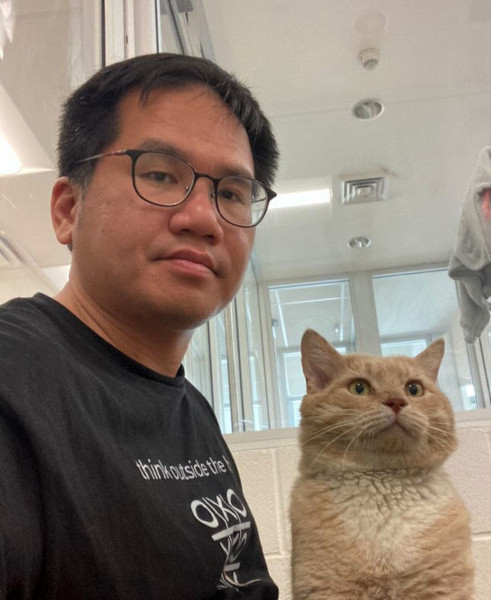
Terry is the founder of Polyglot.tw, the first organized and officially registered polyglot group in Taiwan. He is also an immersion program designer/engineer, a published writer, an entrepreneur and a language revitalization activist. He has learned more than 50 languages to various levels so far and continues to learn new languages. In addition to his linguistic passion, he is also a cat rescuer, a globe-trotter and a hardcore gamer.
Basic Thai Phrases for Your Next Vacation
This 105-minute session is designed to help you navigate Thai pronunciation with confidence while equipping you with essential communication skills for real-life interactions. Whether you’re a first-time visitor or simply interested in the language, this engaging talk will provide practical insights to enhance your understanding of spoken Thai.
We begin by exploring the fundamentals of Thai pronunciation, focusing on unique sounds and tonal variations that distinguish meaning. Through interactive exercises, you’ll develop an ear for these nuances and practice producing them accurately. By mastering these essential elements, you’ll build a solid foundation for clear and effective communication.
The session then shifts toward practical language skills, emphasizing useful expressions for everyday situations. Engaging activities will help reinforce what you learn, making it easier to recall and apply in real-life scenarios.
Beyond pronunciation and practical usage, we will also touch on cultural aspects that shape the way Thai is spoken. Understanding tone, rhythm, and common communication habits will give you deeper insight into how to interact naturally and respectfully.
By the end of the talk, you will feel more confident in your ability to engage with native speakers, making your Thai language journey both enjoyable and rewarding.
Tian Hai (Layla Hai)
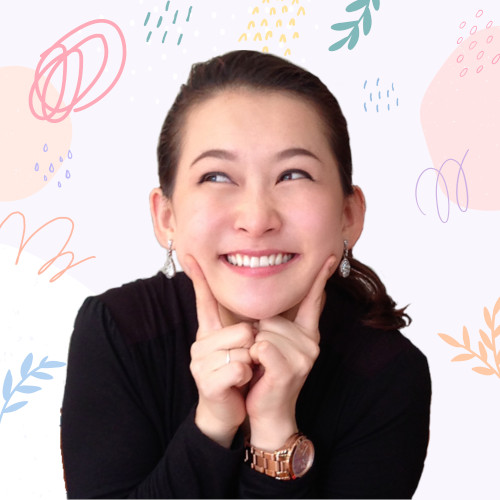
Layla is a third-culture kid who grew up immersed in the cultures of China, Thailand, and the United States. Her passion for effective cross-cultural communication led her to a career as a language teacher and interpreter. Now based in southern Germany, she teaches English and Thai, helping students bridge linguistic and cultural gaps with confidence.
Count your peas, build donkey-bridges and pun like a German! – A quick guide to germanize your mind and humor :-)
Language: English with pinches of German
A mess of harsh white noise, unpronounceable sounds, absurd compound words, arbitrarily random sentence structure, a brutal sense of straightforwardness, and of course the infamous “missing humor gene”… These are just some of the cliches the “awful German language” is commonly labelled with. And if words like Arbeitsunfähigkeitsbescheinigung or Telekommunikationsdienstleistungsunternehmen already scare the hell out of you, what about the legendary Donaudampfschifffahrtselektrizitätenhauptbetriebswerkbauunterbeamtengesellschaftsmitarbeiterversicherungsmaklergebührenverordnung?!
Fear not, my friend! In this talk, we will debunk some of the most widespread myths about the German language and its speakers and shed some light on the fascinating logic beneath what may sound like nonsensical gibberish. You’ll walk away with practical strategies, not only to crack endless words while also getting some fun mnemonic aids and puns, besides a deeper understanding of how German mentality and sense of efficiency is reflected in their language.
Whether you’re a beginner, advanced learner, or just a daredevil who wants to get a whiff of Mark Twain’s all-time favorite love-hate-language, this talk is for you!
Vanessa Berger
Vanessa, also known as Linguadicta, is a language edupreneur, freelance teacher, and content creator. Over the past few years, she has been teaching her mother tongue to more than 1,500 students across 5 languages. She firmly believes that language learning and personal development are closely intertwined. A seasoned globetrotter in pre-pandemic times, Vanessa is now nomading and housesitting across Europe while following her mission to guide and coach fellow language enthusiasts through their own lifelong learning journeys.
Linguistic adventures of a Ukrainian teacher of English on a Czech-learning journey
My favorite question asked by my Czech colleagues since I came to Prague in 2022 has been “Is the difference between Ukrainian and Russian the same as between Czech and Slovak?” In my presentation, I’m going to explain why it is much bigger but may seem the same due to the artificial assimilation of Ukrainian to Russian during the Soviet times.
I also hope to entertain you with my story of learning Czech only by listening and being the subject of many smiles or blank faces due to using false friends or making mistakes with direct translations of set expressions and idioms. We will also see why trying to understand a word or phrase in Czech through its English translation is for a Ukrainian like scratching your left ear with your right hand :-) At the end, I will give my own comparison of Ukrainian and Czech (including their history) from the point of view of a linguist, English teacher and a native Ukrainian speaker.
Victoria Burbelo
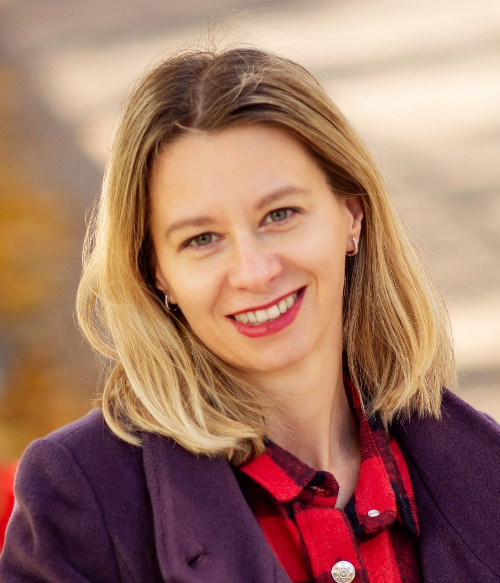
Victoria Burbelo is an ESL teacher with 26 years of experience from Dnipro, Ukraine. During her career, she was a language school owner, copywriter, interpreter, and a manager of an international localization conference “UTICamp”. In March 2022, she relocated to Prague with her two children and is now working as a full-time teacher of English at Gymnázium Nad Štolou. Victoria writes poetry and articles in English, Russian, and Ukrainian. She has recently got interested in the processes taking place in modern Ukrainian and would like to offer her perspective on the comparison of Ukrainian and Czech.
Why you don’t understand French people when they speak and how to get there !
Avez-vous du mal à comprendre les Français quand ils parlent entre eux ? Ne vous inquiétez pas, c’est normal ! Dans cet atelier, nous allons expliquer les transformations que les Français font du langage commun basique au moment de parler mais nous allons surtout vous les enseigner pour que vous puissiez parler comme un vrai français !
L’objectif de cette atelier est de passer un bon moment et de découvrir des conseils, super pratique pour votre utilisation du français.
Vincent BOUEN
My name is Vincent . I’m a French teacher. I’ve been teaching for 15 years and in my social media I teach French the way it is spoken.
La vida de un políglota adolescente
Language: Spanish
Hay muchas historias de políglotas adultos que ya han aprendido 10 idiomas y tienen muchos años de experiencia. ¿Pero cuántas historias de políglotas adolescentes has escuchado? ¿Tres o dos?
En este discurso me encantaría mostraros cosas de detrás de las cámaras de mi vida y de las de mis amigos políglotas. ¿Qué desafíos afrenta un políglota adolescente?, y lo más importante; ¿cómo los afrentamos? Desearía cubrir el tema de nuestra «fluencia» en tecnología, que según algunos poseemos como los adolescentes y ¿cómo la aprovechamos a nuestro favor?
Wiktor Gołaszewski
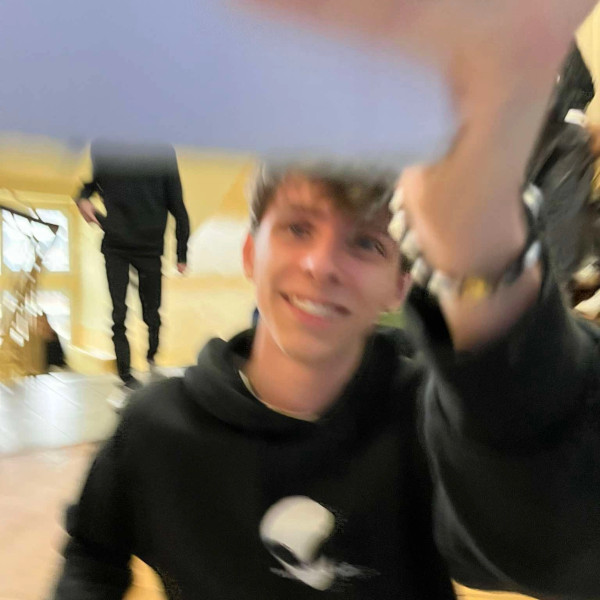
Wiktor (pronounced just like Victor ;P) is a 17-year-old passionate about languages and language learning. He has a long list of languages he hopes to learn throughout his life. His main goal is to promote language learning as a fun and productive way to spend time, especially among teenagers.
Cryptography: Encrypting and hiding language
Language: English
During this talk. You will learn the basics of cryptography in general, encrypting and decrypting messages using a variety of ciphers, and learn the history of how many different ciphers were used throughout the years (such as the Enigma machine during World War II, the cipher that the Zodiac killer used, and the Copiale cipher).
Witold Kanafa
Witek is a programmer as well as a experimentalist. They like to tinker with life when it comes to exploring new things.
Никогда не поздно: Изучение иностранных языков представителями серебряного поколения
Language: Russian
Сегодня всё больше представителей так называемого «серебряного поколения» — людей в возрасте 60 лет и старше — начинают изучать иностранные языки. Это явление становится не только популярным, но и научно обоснованным: современные исследования подтверждают, что обучение новым языкам в зрелом возрасте положительно влияет на когнитивные функции, память, внимание и общее психоэмоциональное состояние.
В рамках выступления мы рассмотрим ключевые мотивации пожилых людей к изучению языков — от желания путешествовать и общаться с семьёй за границей до стремления поддерживать активную умственную деятельность. Особое внимание будет уделено методам преподавания, адаптированным под потребности и особенности возрастных учащихся, а также барьерам, с которыми они сталкиваются, и способам их преодоления.
Также будут представлены успешные практики и примеры из реальной жизни: клубы, онлайн-курсы, инициативы местных сообществ и международные проекты, направленные на поддержку языкового образования в старшем возрасте.
Выступление будет интересно преподавателям, специалистам в области геронтологии, а также всем, кто верит в обучение на протяжении всей жизни и хочет поддержать активное старение.
Zbigniew Grzymala
Zbigniew Grzymała, PhD, DSc, Associate Professor, Institute of Finance, Department of Enterprise. Number of years of work in the current company: at the Warsaw School of Economics – 33 years. For 12 years he was the head of the Department of Economics and Finance of Local Government. Key qualifications: ratio analysis of the company (balance sheet, income statement, employment and wages, fixed assets, etc.); strategic analysis of the organization (creating strategies for the development of organizations, especially local government units), analysis of the commune budget (income, expenses); analysis and evaluation of the effectiveness of capital expenditures in infrastructure, including logistics infrastructure, cost-benefit analysis, business plan and feasibility studies of investment projects, life cycle of products in municipal industries, economics of the public sector, economic policy, spatial policy, spatial management, restructuring of the municipal sector, ecologist – Circular Economy, including energy transformation of municipal economy, management property. Participation in many research projects on urban economy and the SME sector. Author of numerous publications on the issues of local government, municipal management, including the waste management industry.
Survive Brno in Czech: A Playful Crash Course
Language: Czech, English
Planning to wander the streets of Brno but afraid of accidentally ordering ten beers instead of one? 😅 Join slowczech for this playful crash course in survival Czech designed specifically for Polyglot Gathering participants!
This is not your typical classroom workshop. We’ll laugh, play, and learn the absolute essentials for navigating life in Brno fom ordering food to asking for directions, buying tram tickets, and politely declining that fourth shot of Slivovice. You’ll learn basic yet real-life Czech phrases through funny role plays, mini sketch games, improv challenges, and maybe a Czech-language “charades” competition.
All levels welcome—even if “Dobrý den” is all you know. You’ll leave with practical phrases in your pocket, a smile on your face, and probably even a local friend or two.
Come ready to move, laugh, and say “Prosím” like you mean it.
Workshop led by Eliška and Šárka from slowczech, the no-stress Czech learning community.
slowczech (Eliška Kryslová and Šárka Jeřábková)
Eliška Kryslová is the founder of slowczech and a passionate language mentor on a mission to help learners feel at home in Czech conversations. With a personal experience learning French, she brings warmth, energy, and humor to every workshop.
Šárka Jeřábková is a slowczech tutor who also teaches German and Spanish. A true sunshine soul, she thrives by the sea and loves hot weather. Her playful and empathetic approach makes language learning feel fun, natural, and deeply human.
